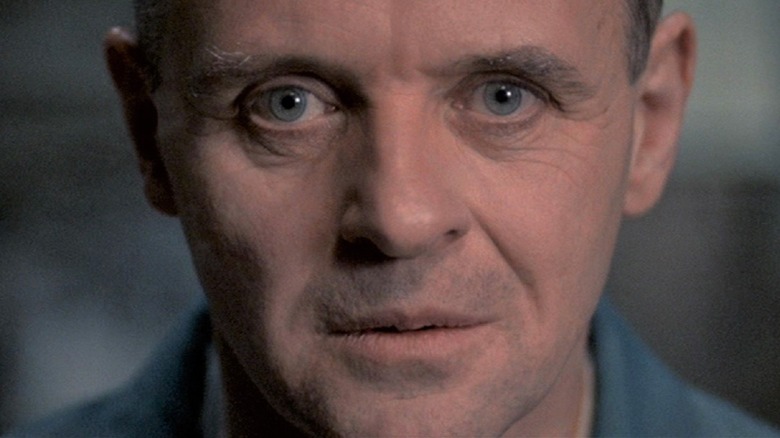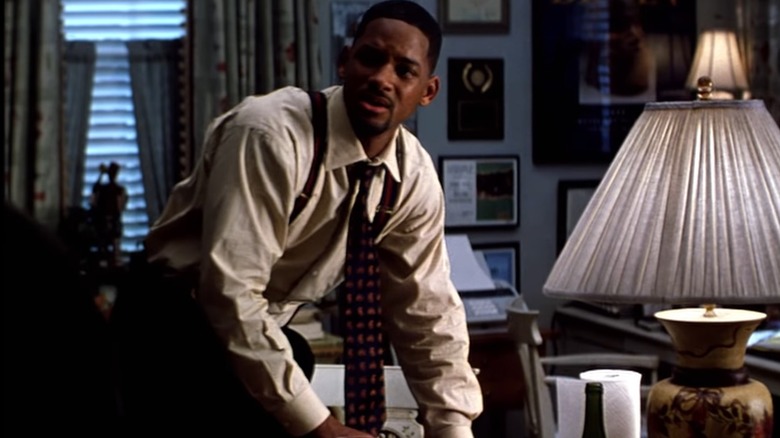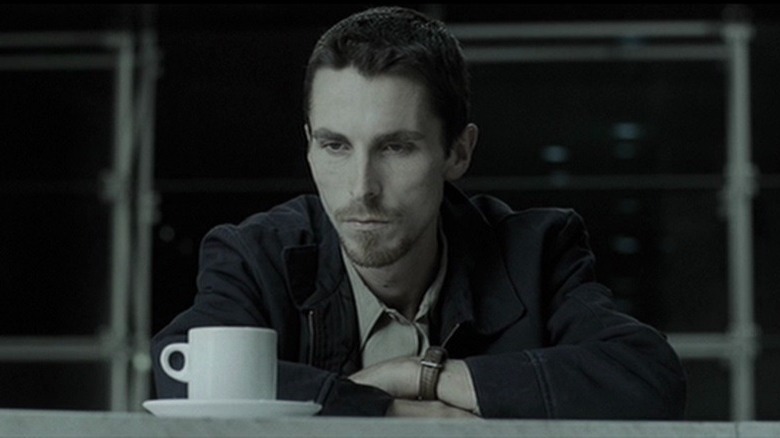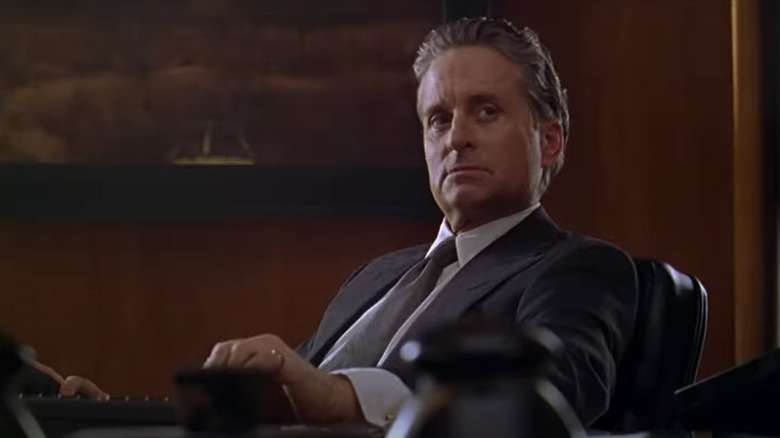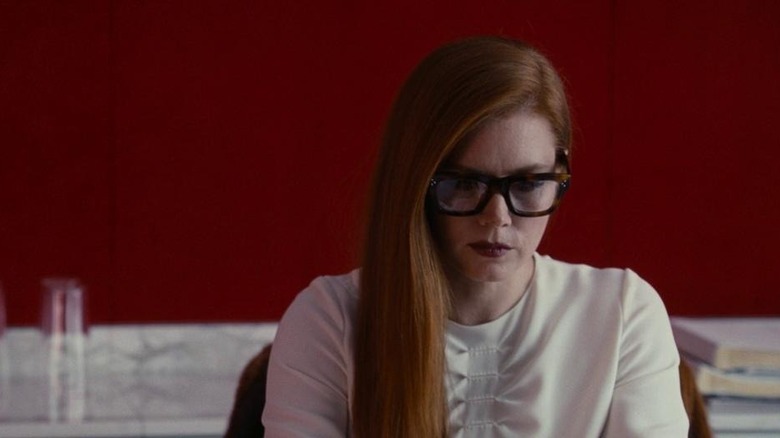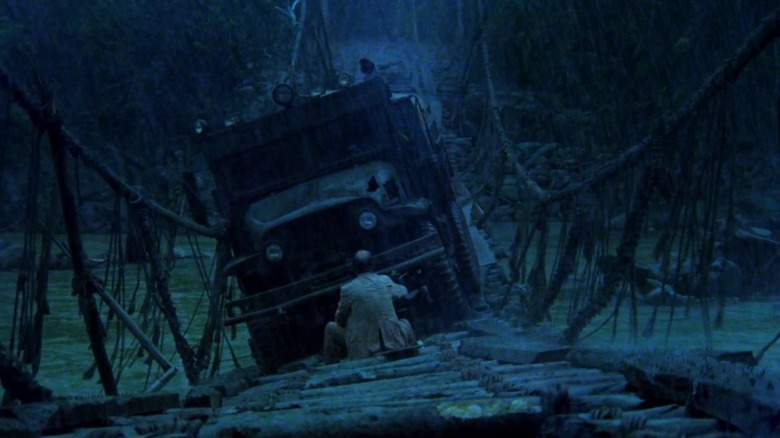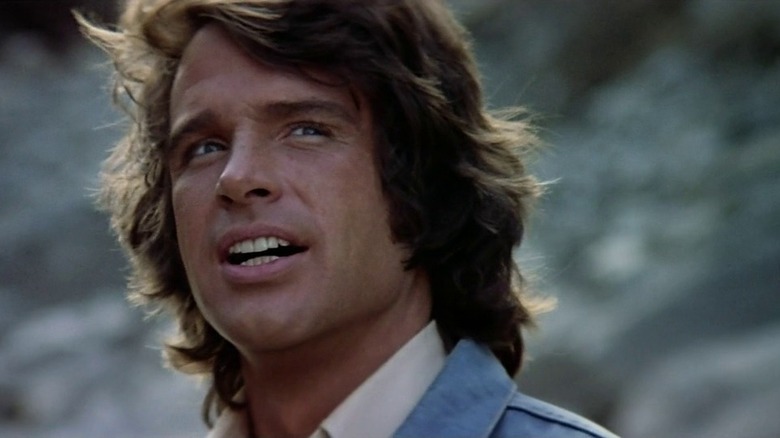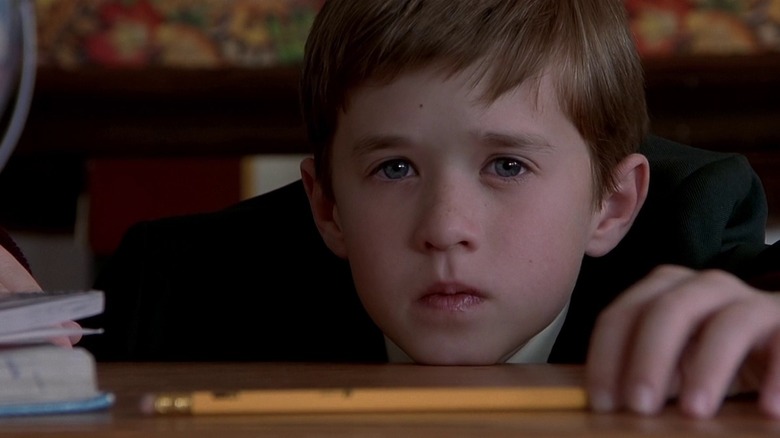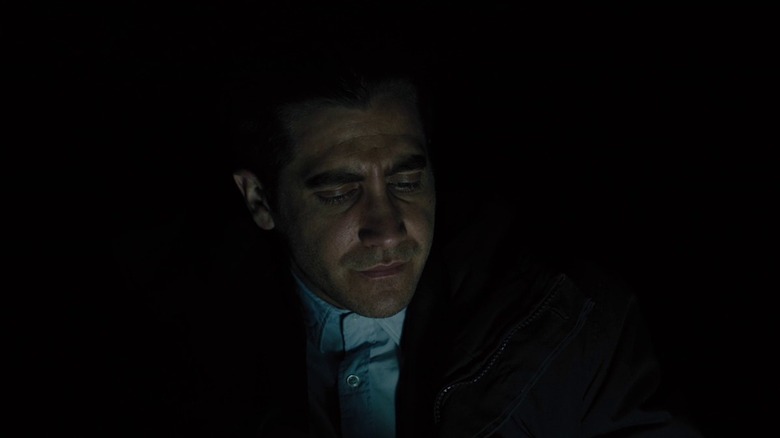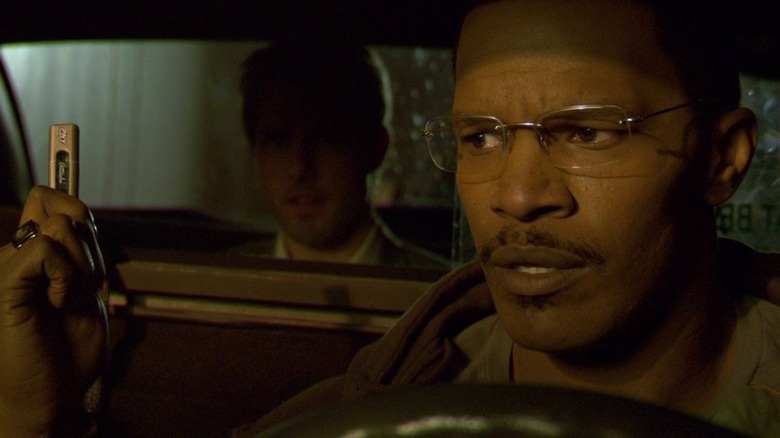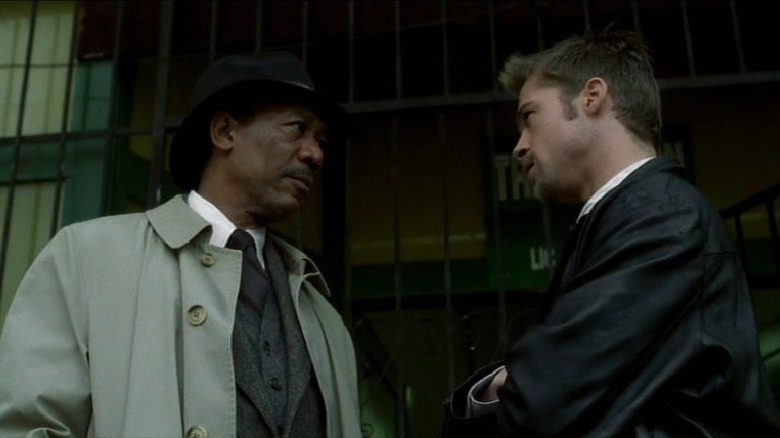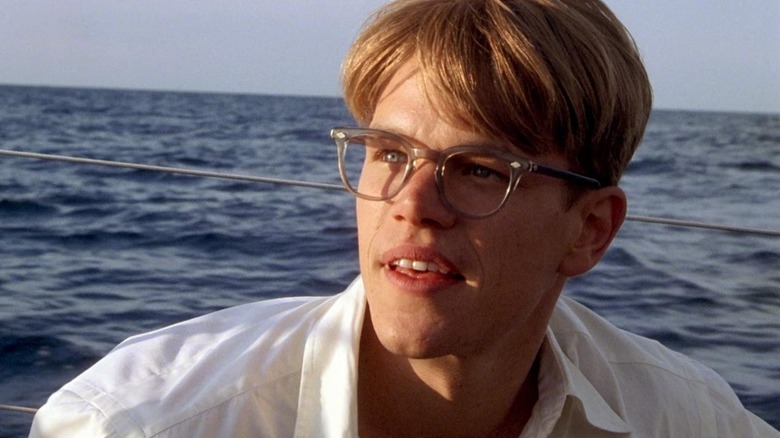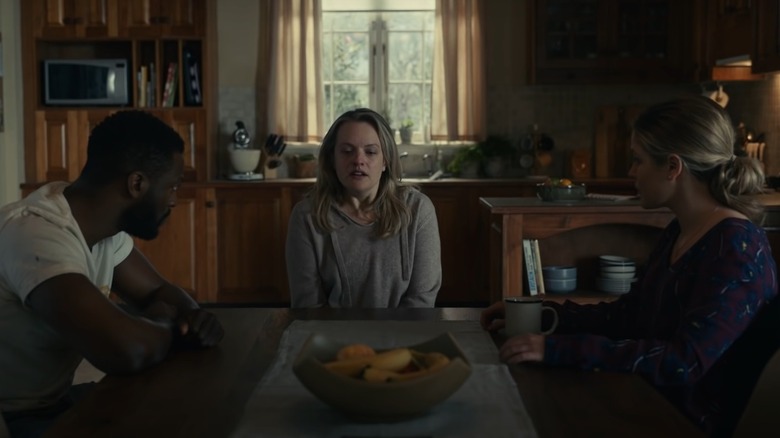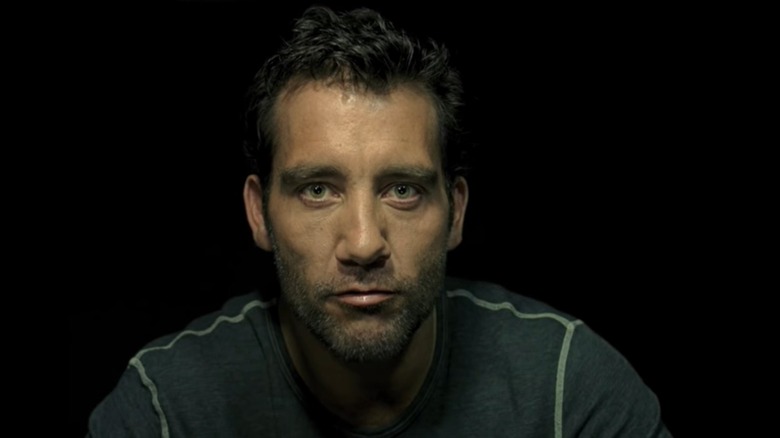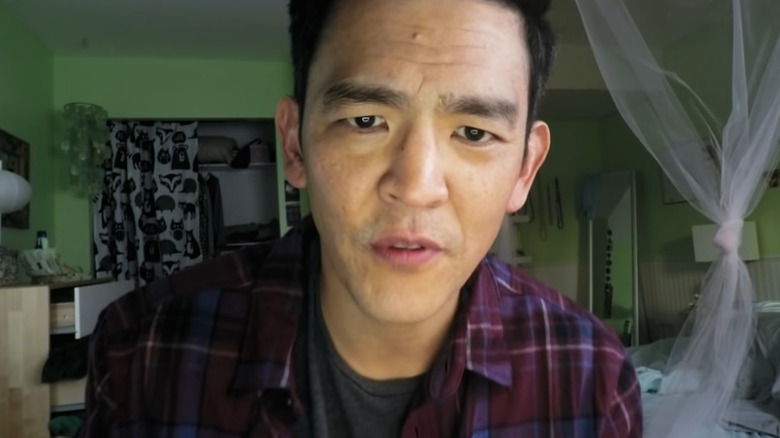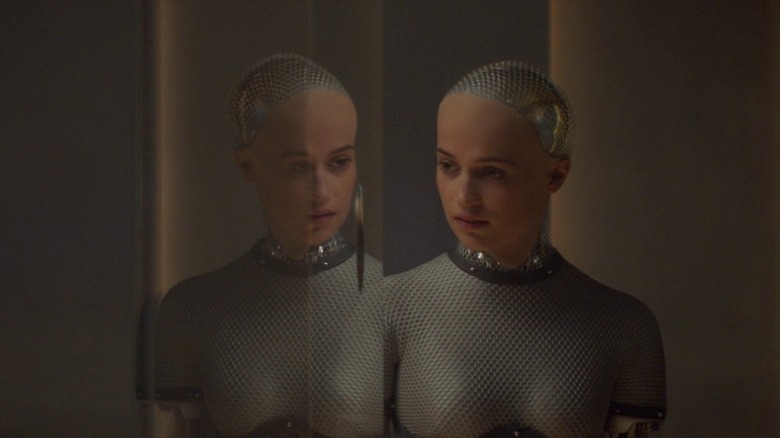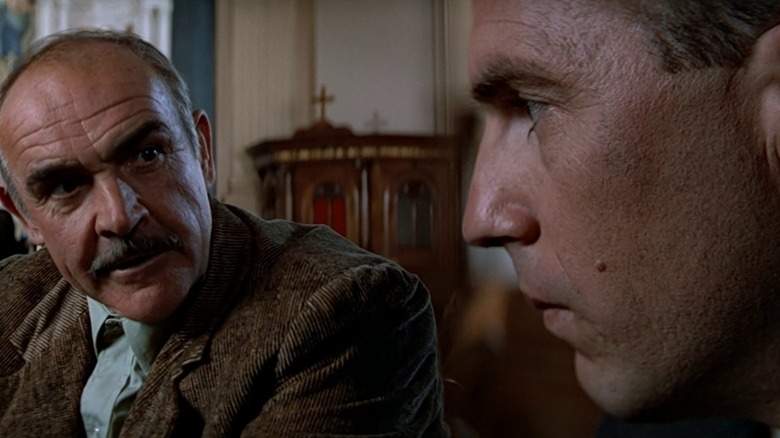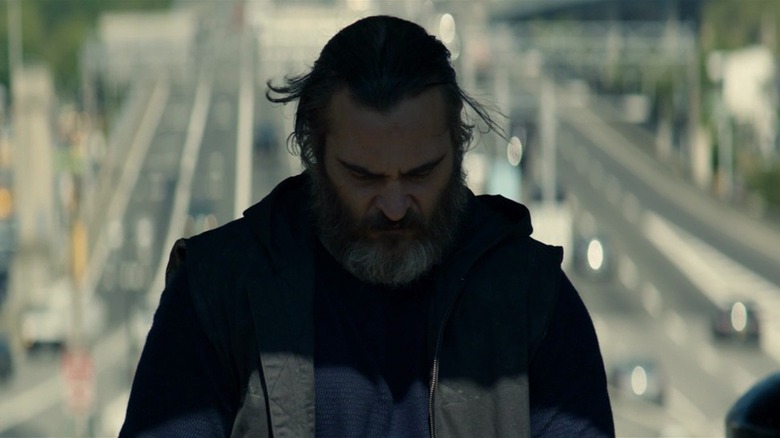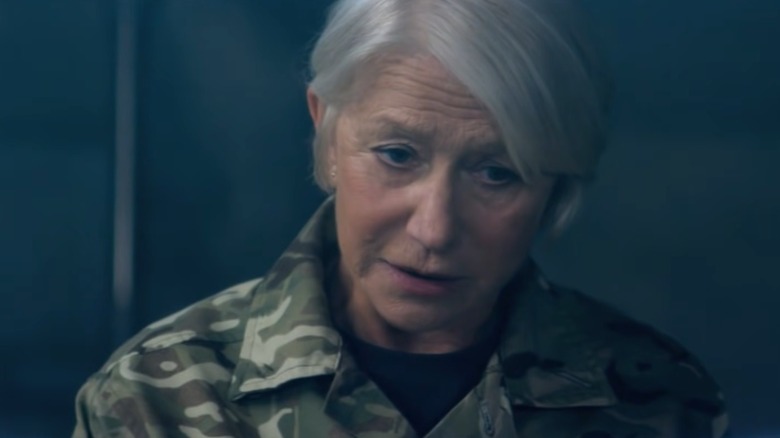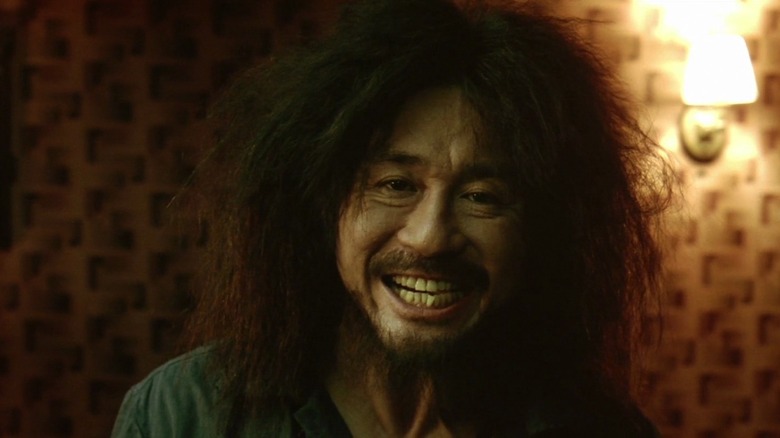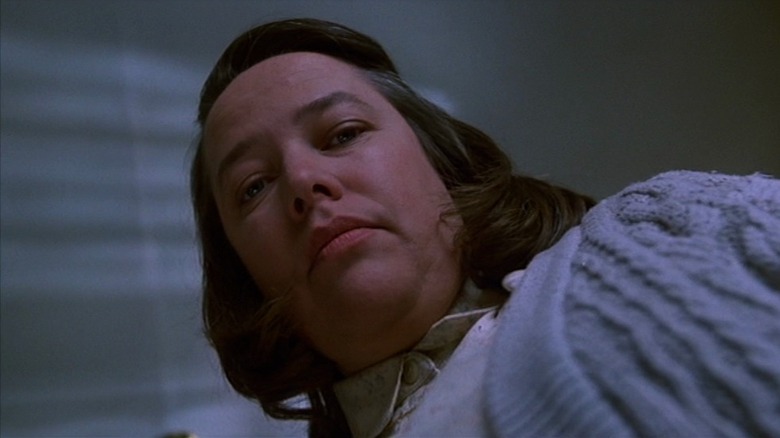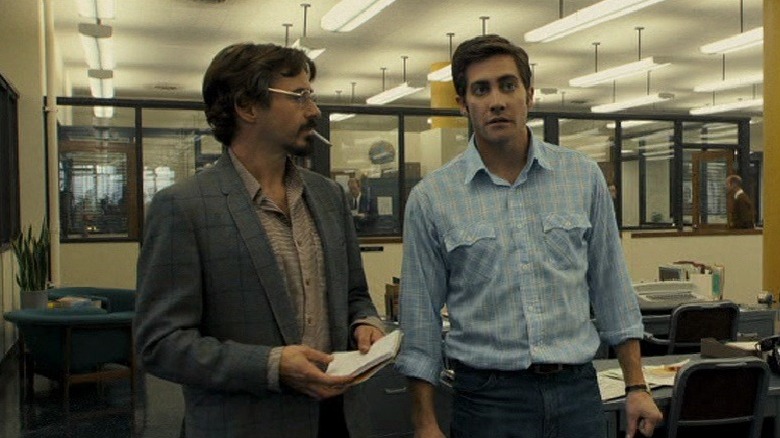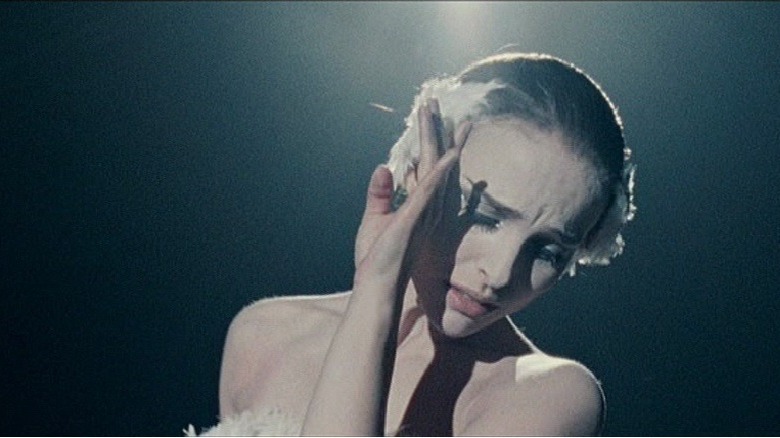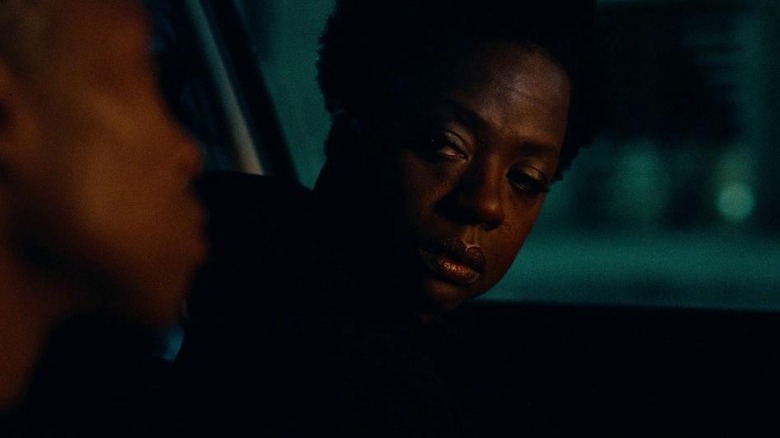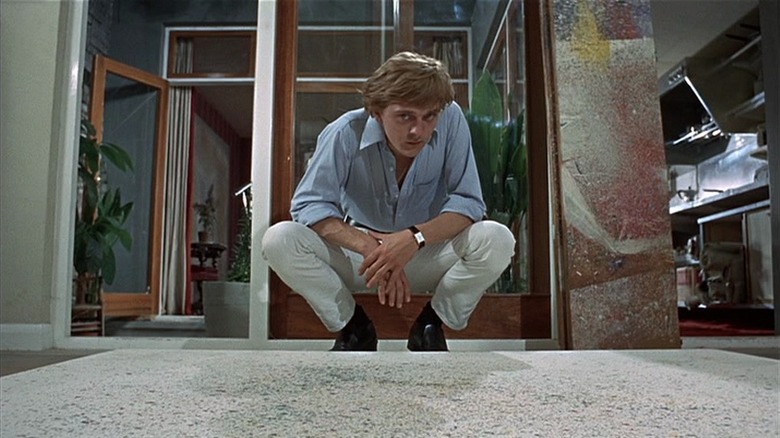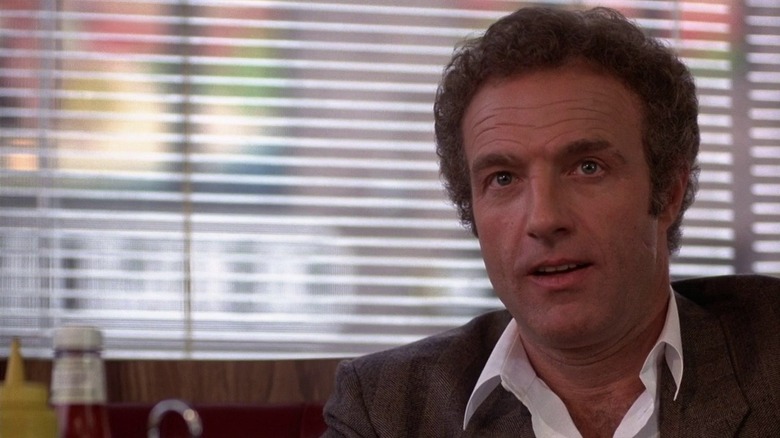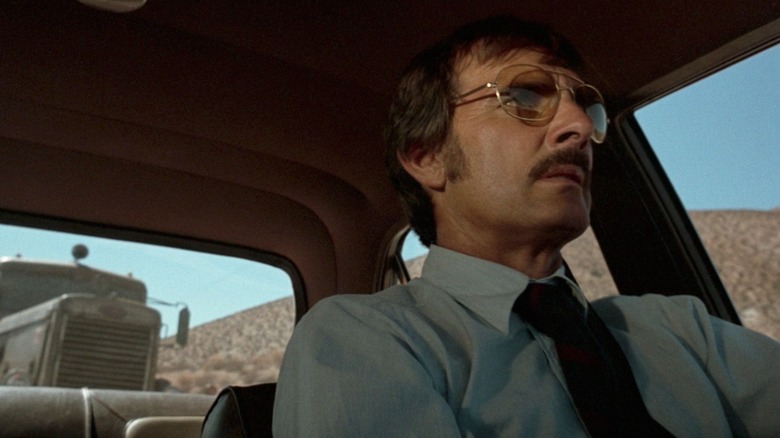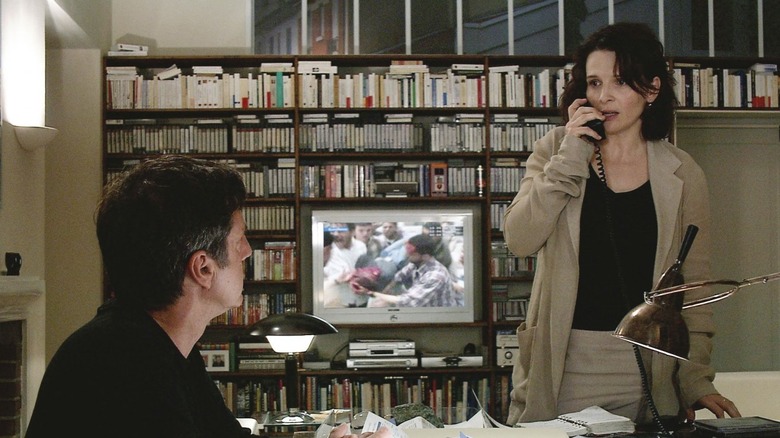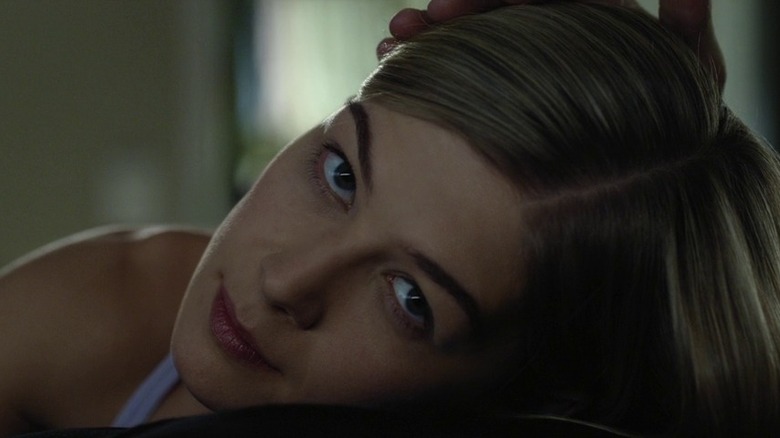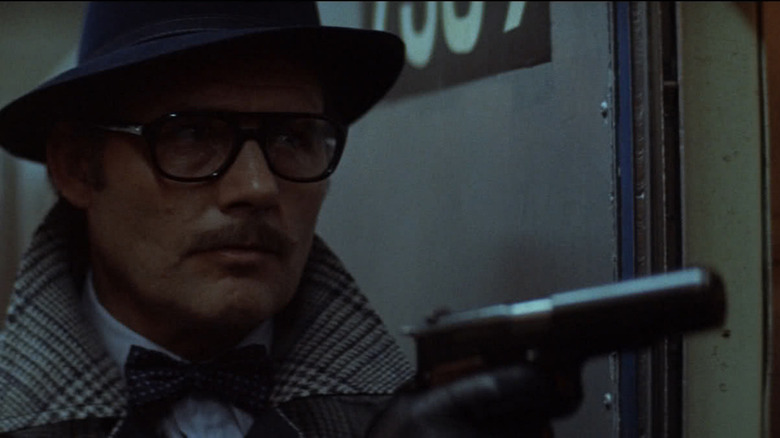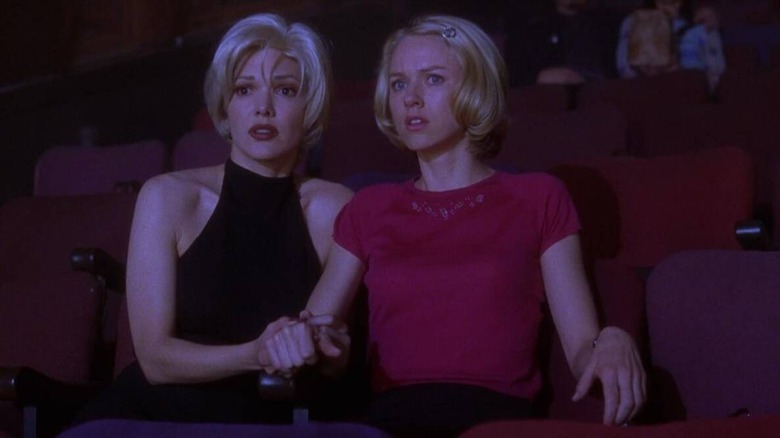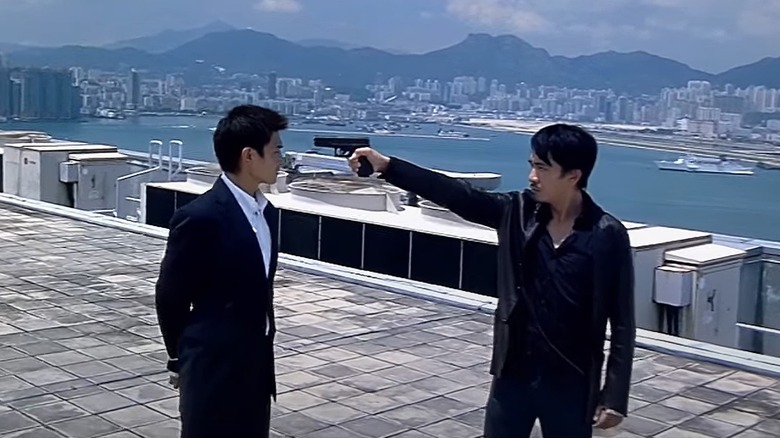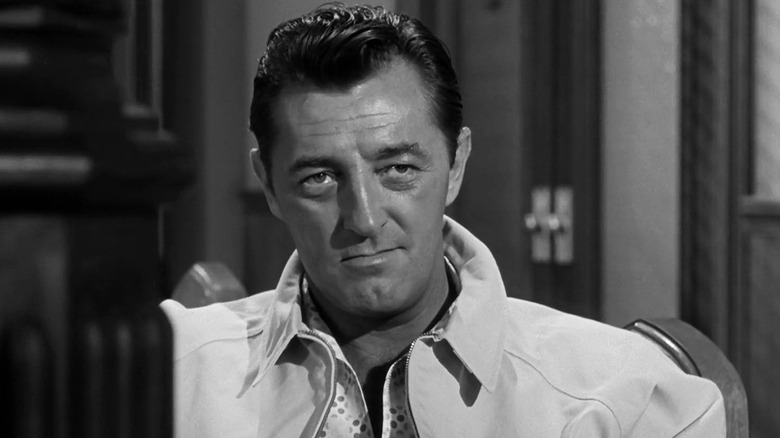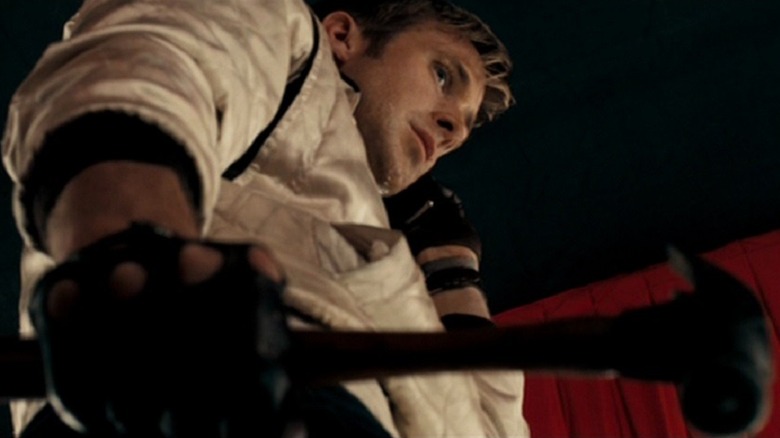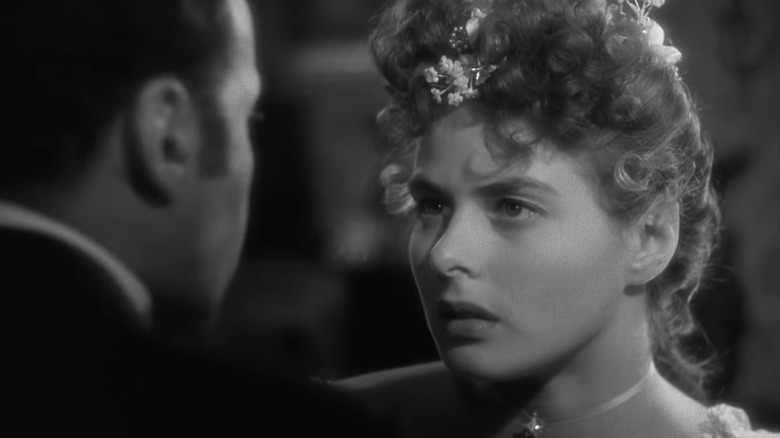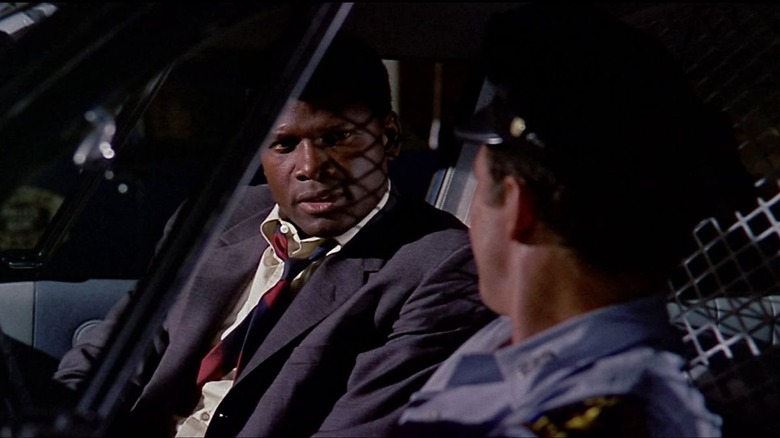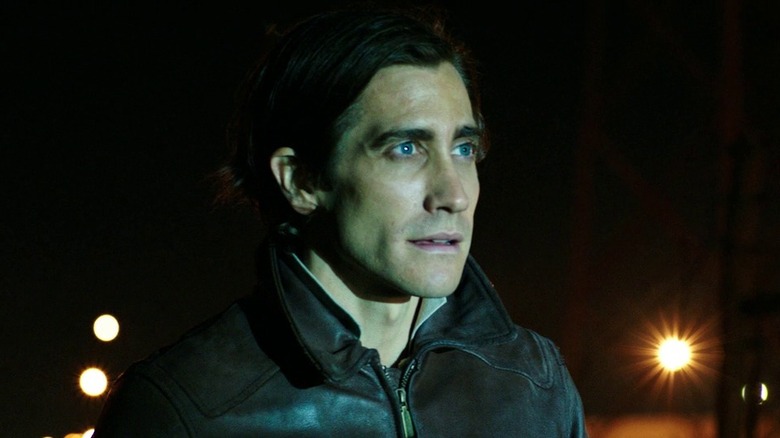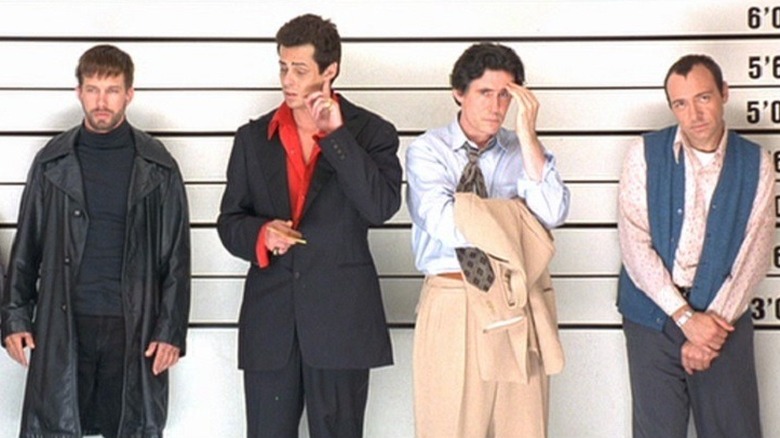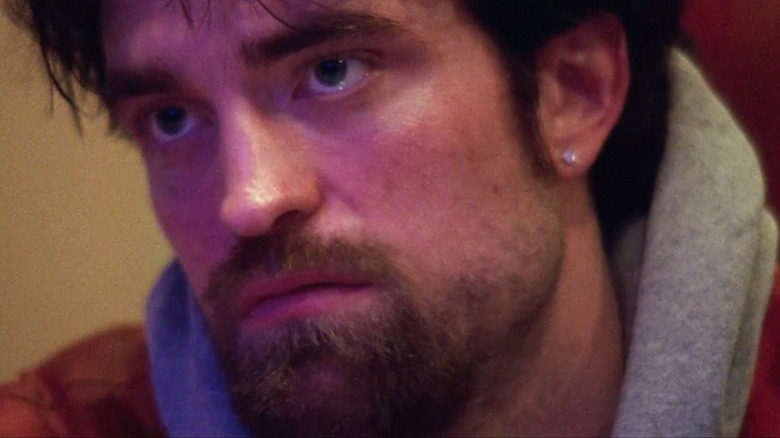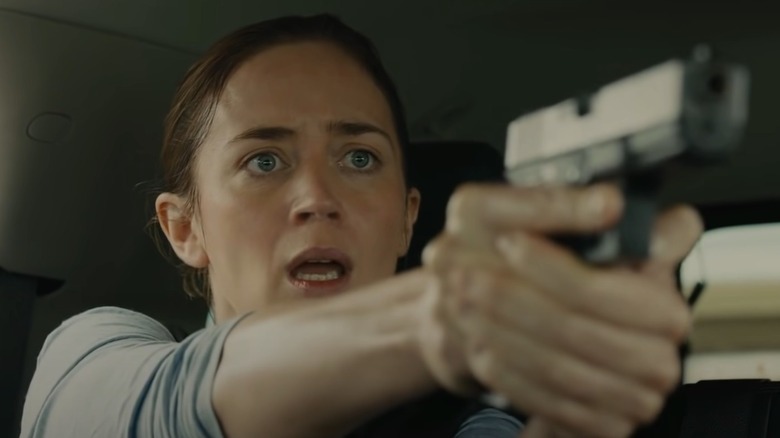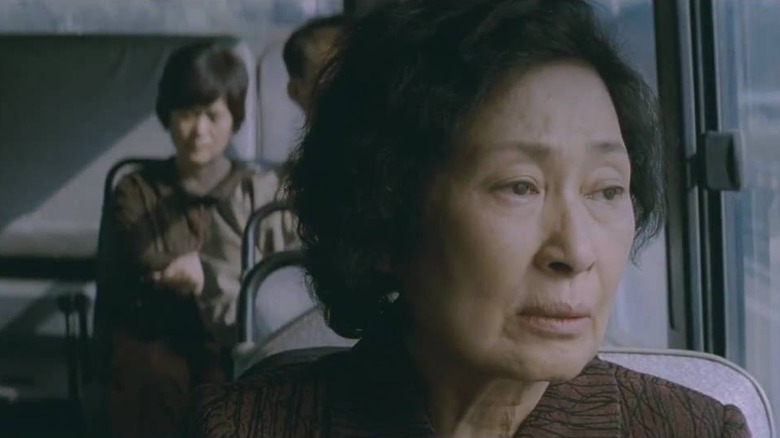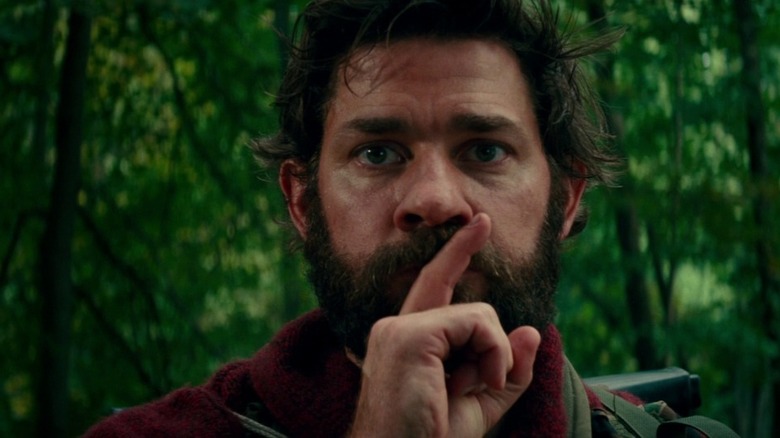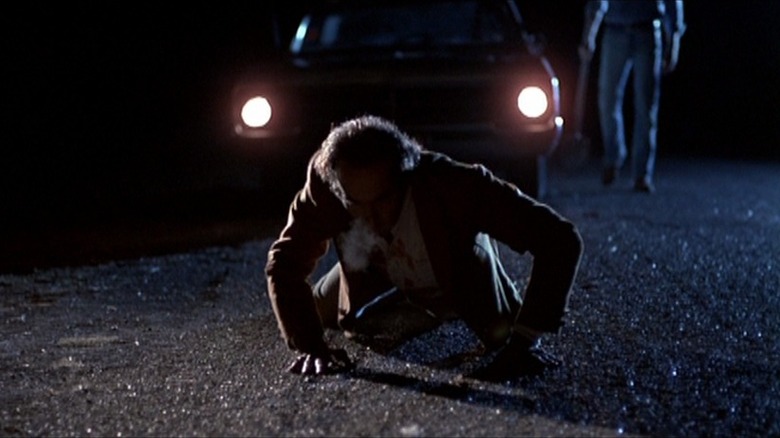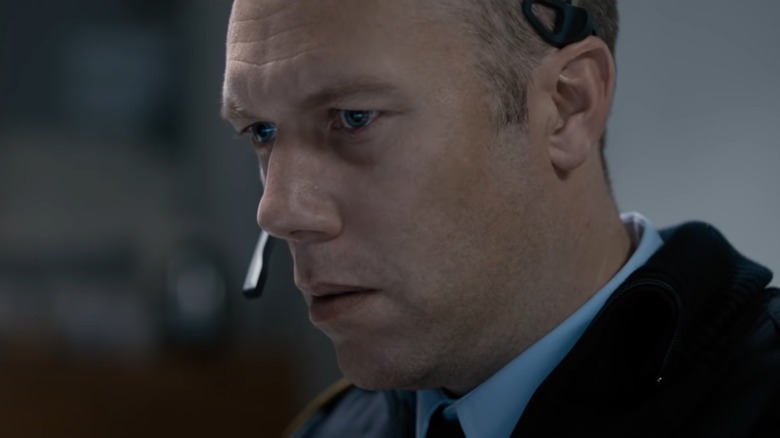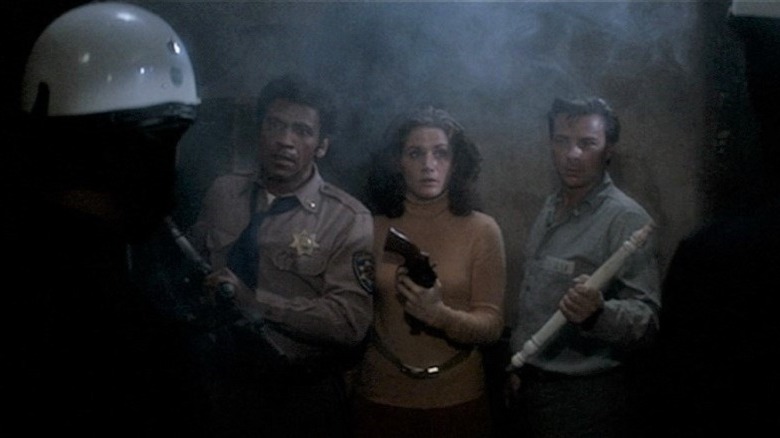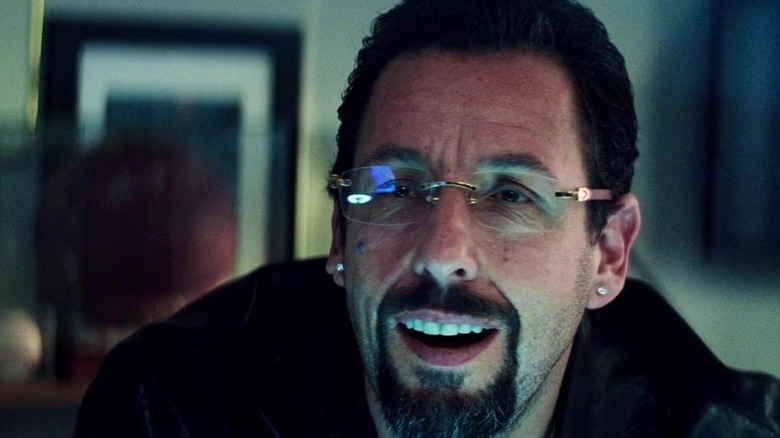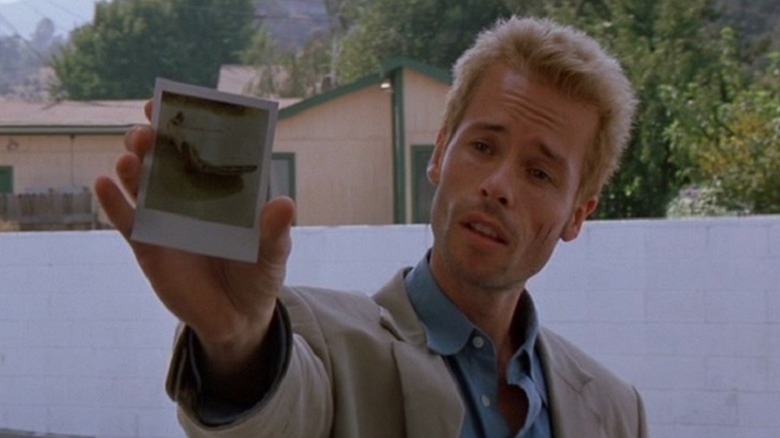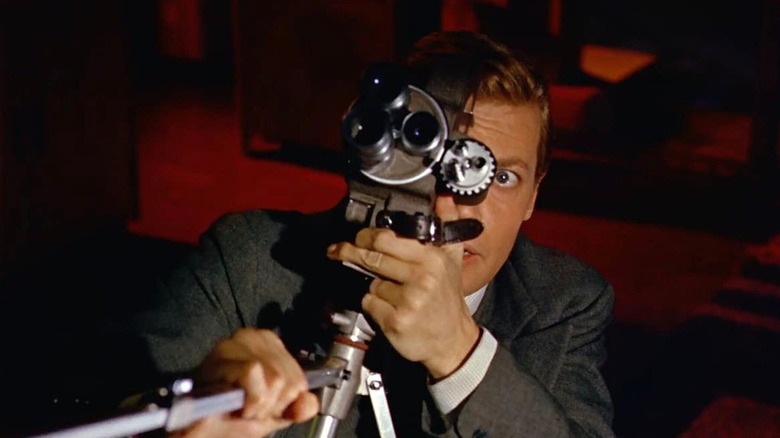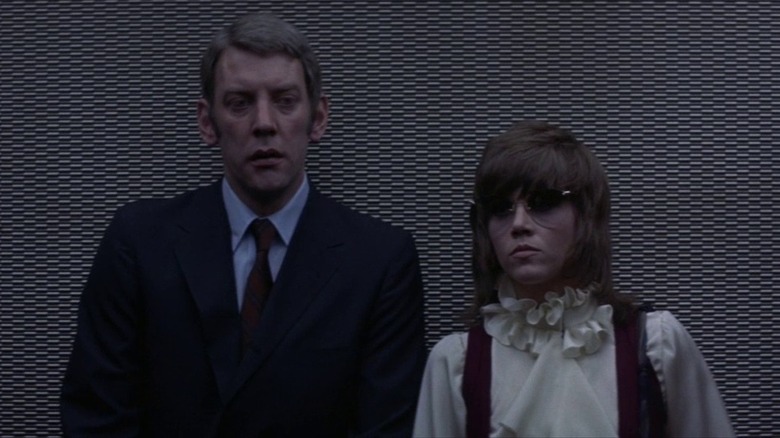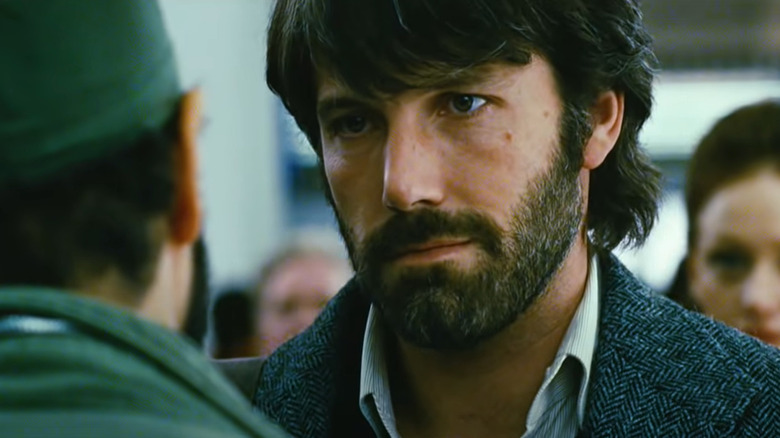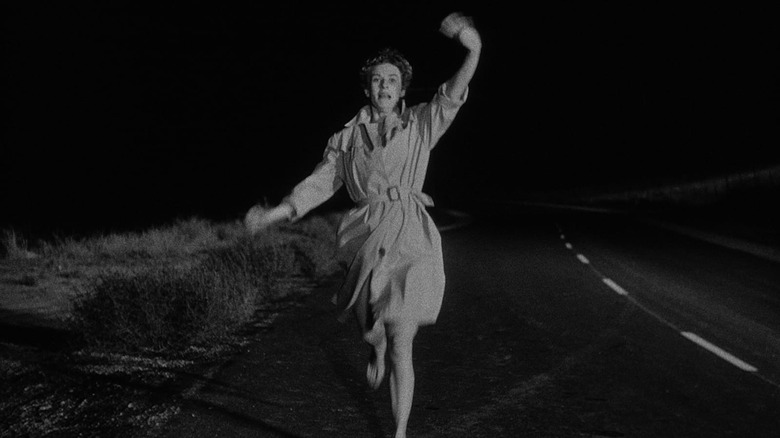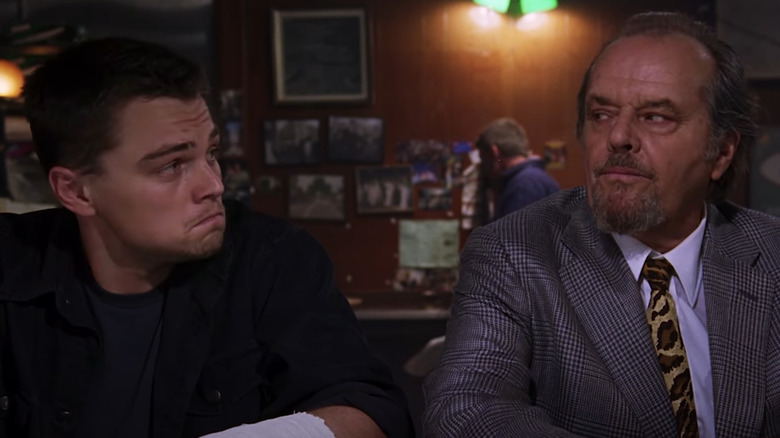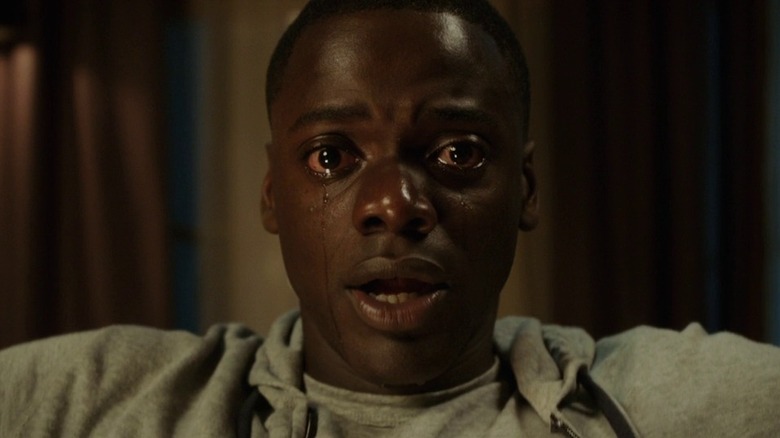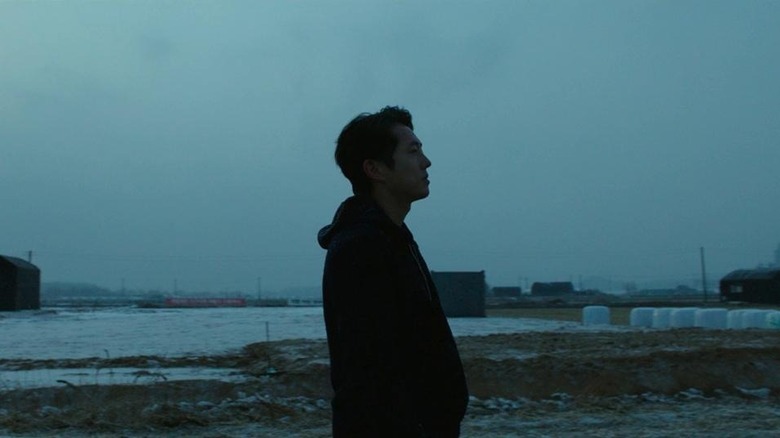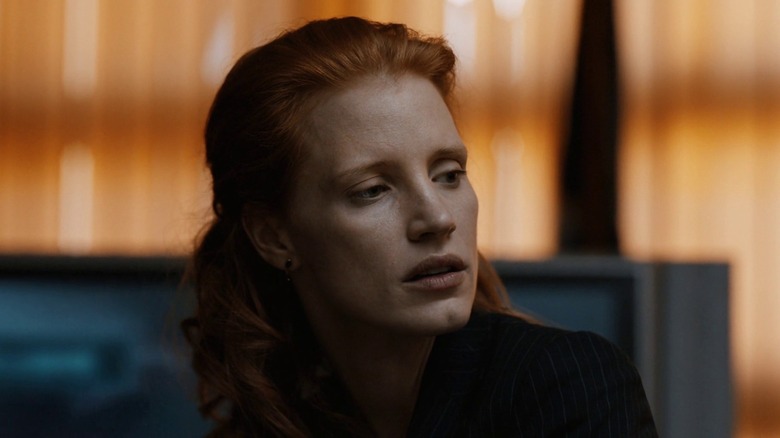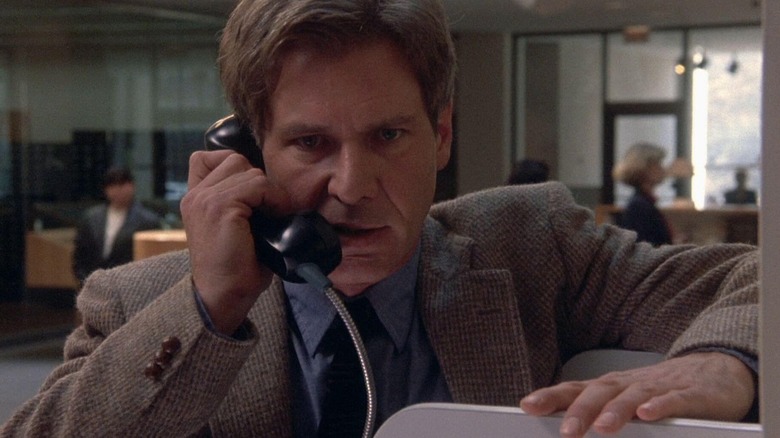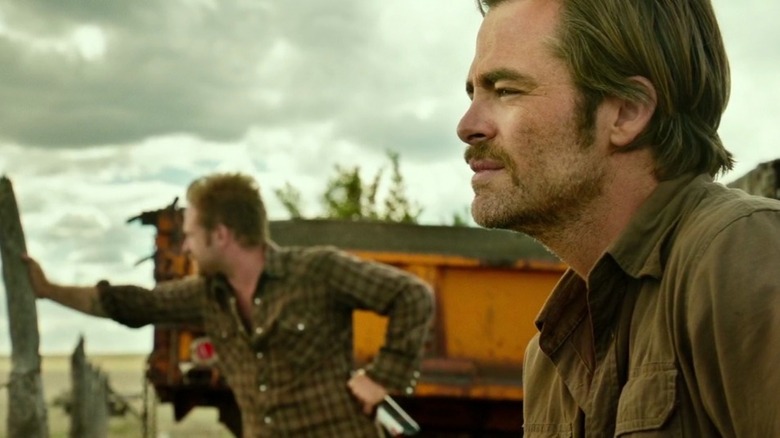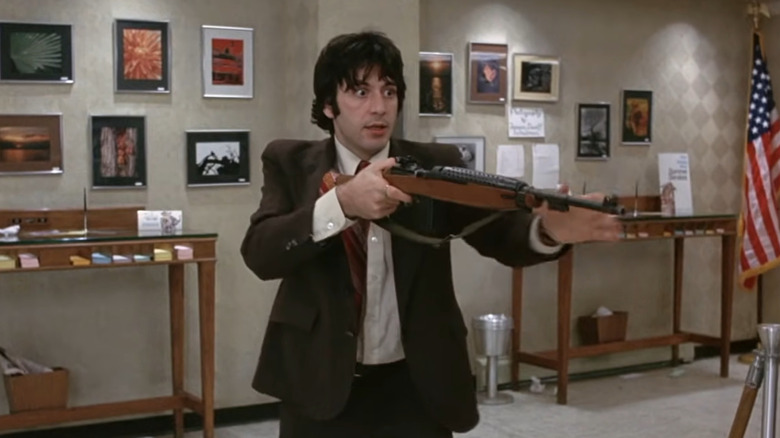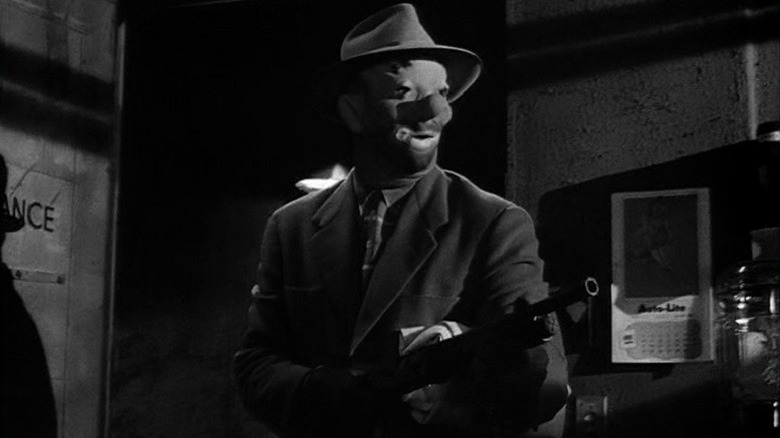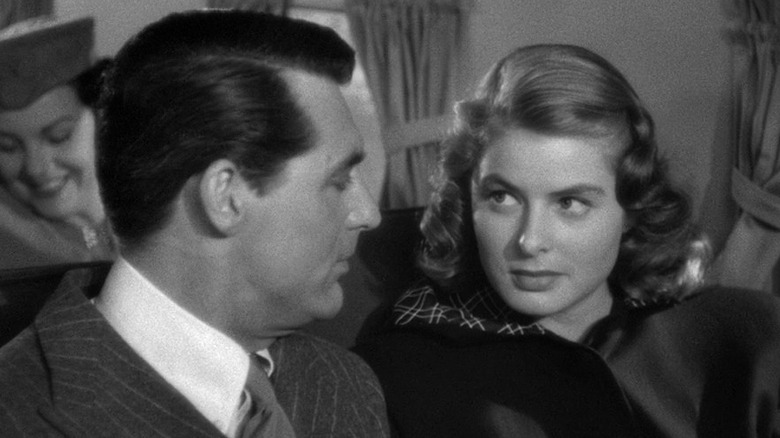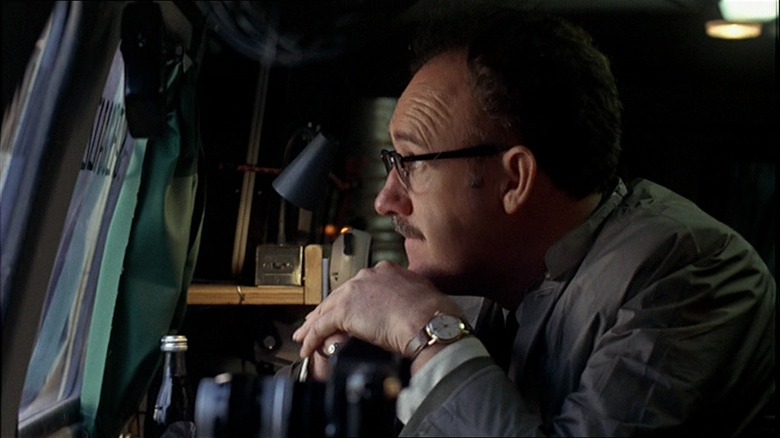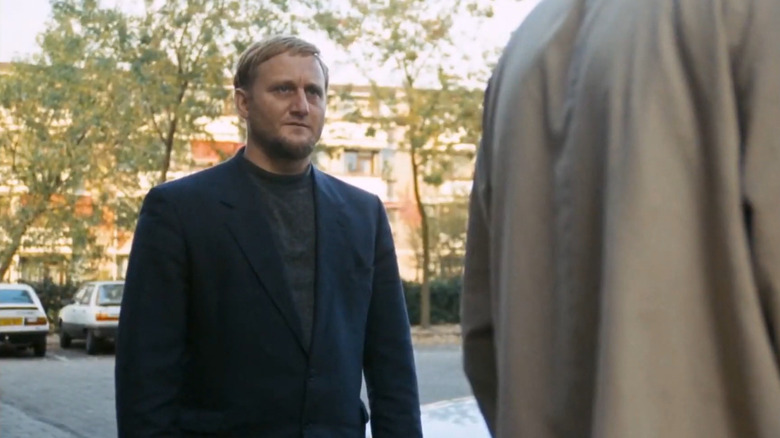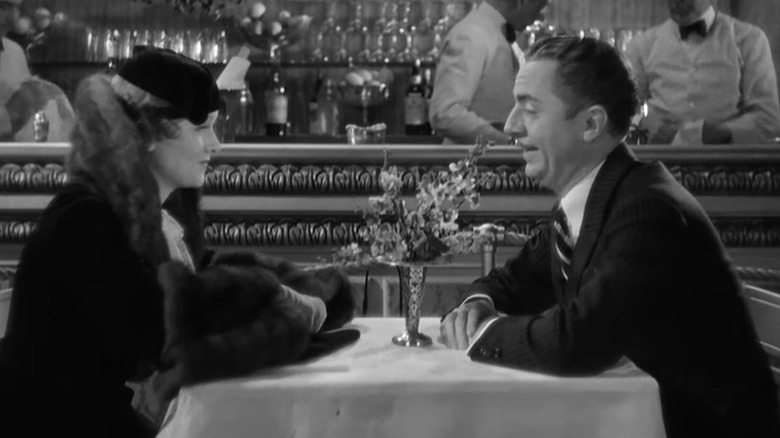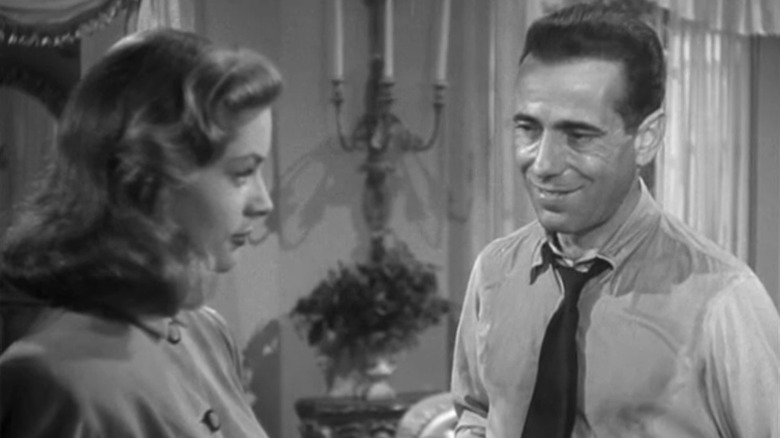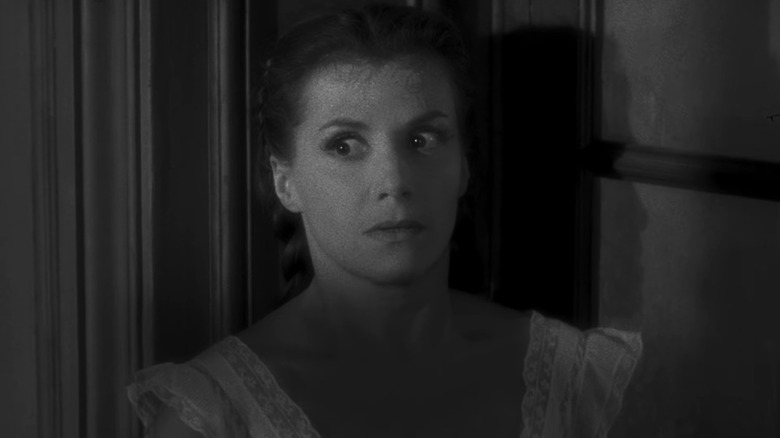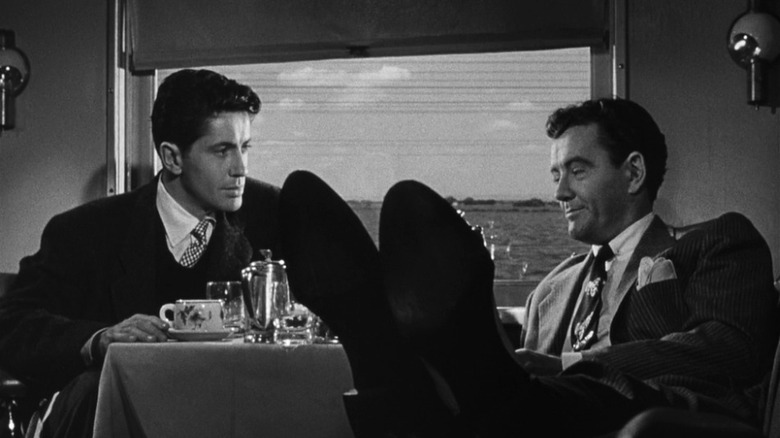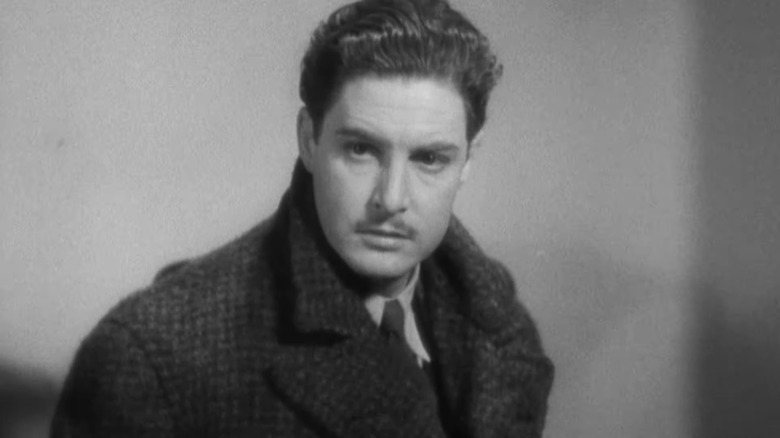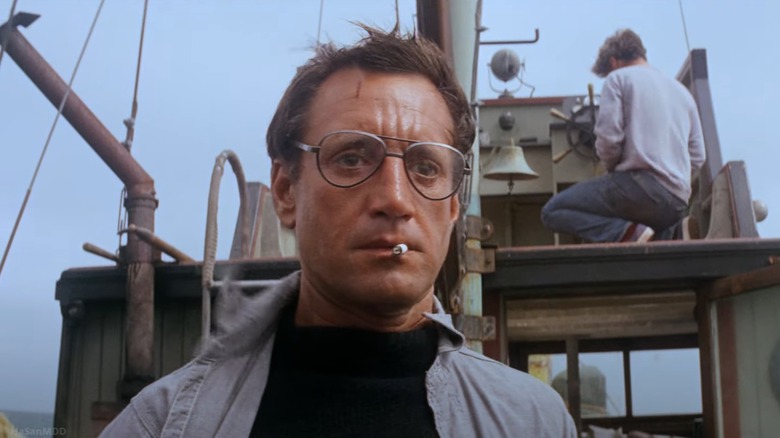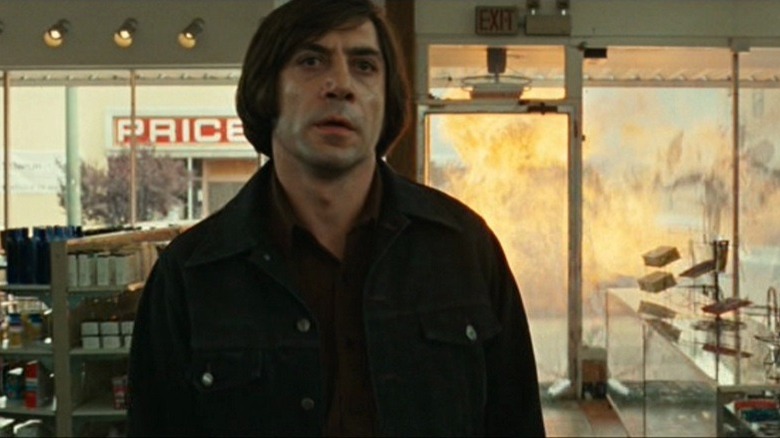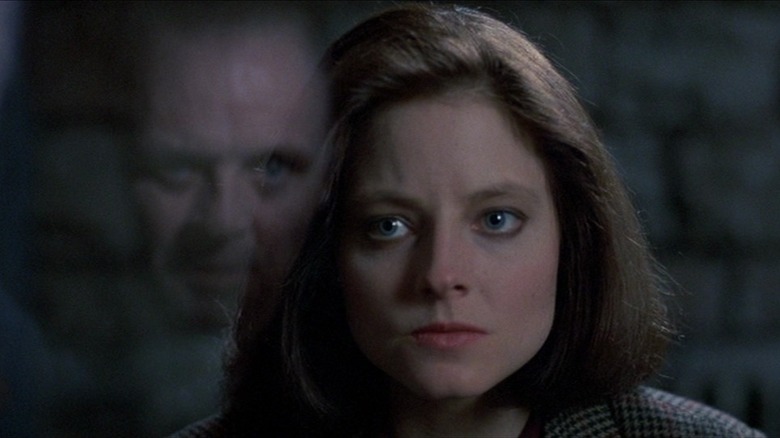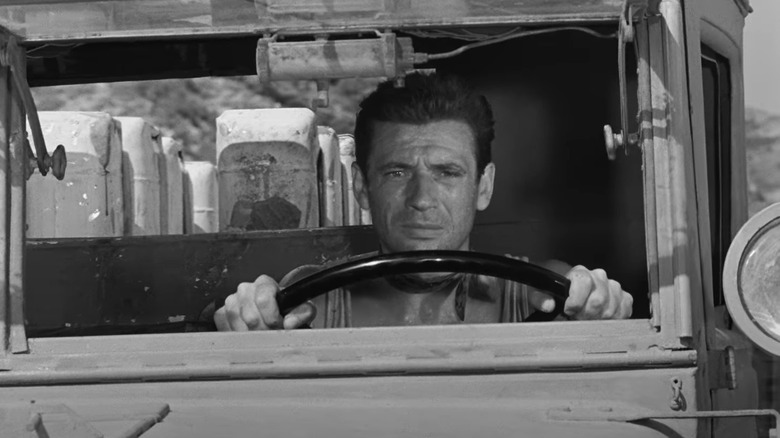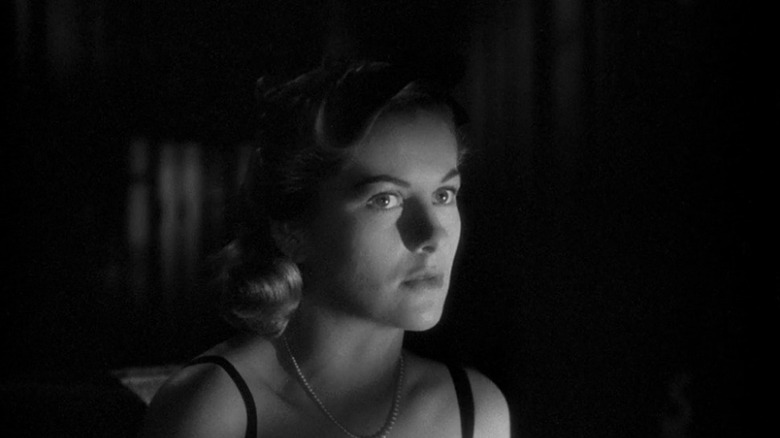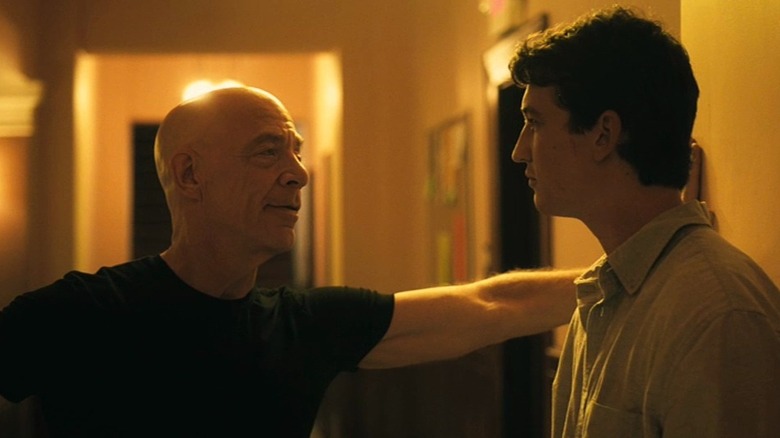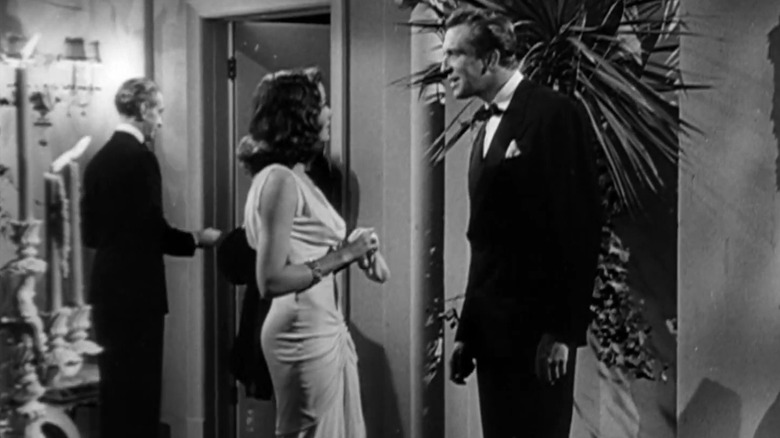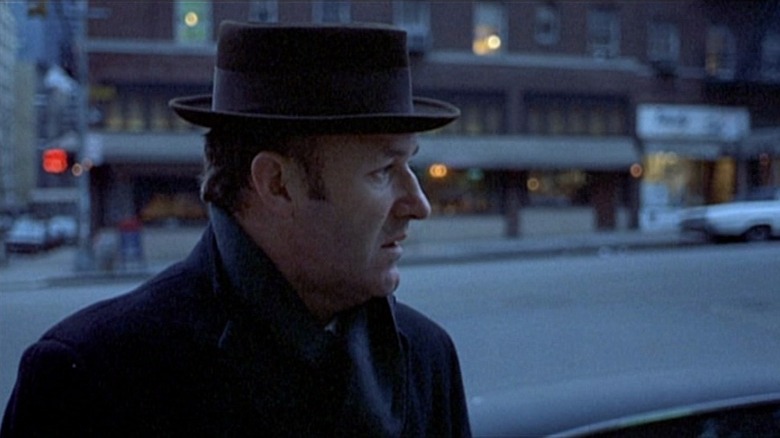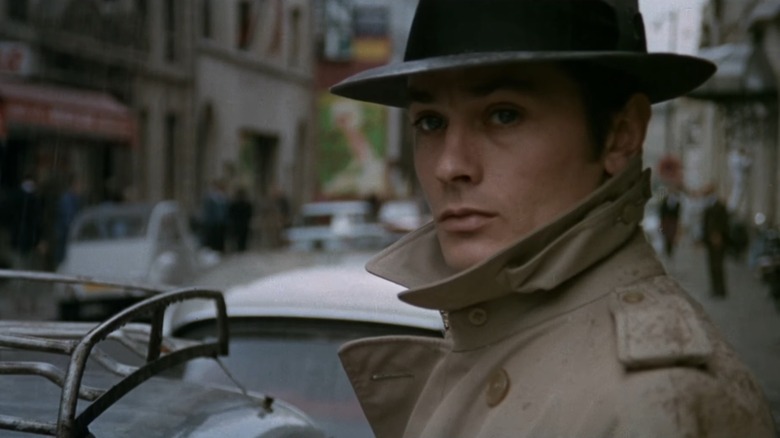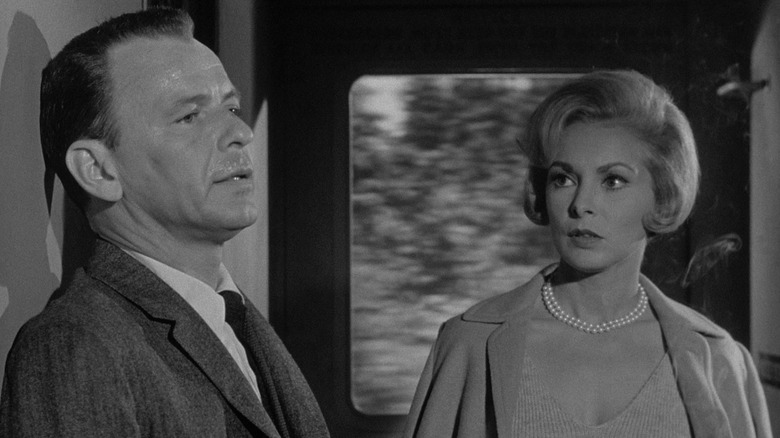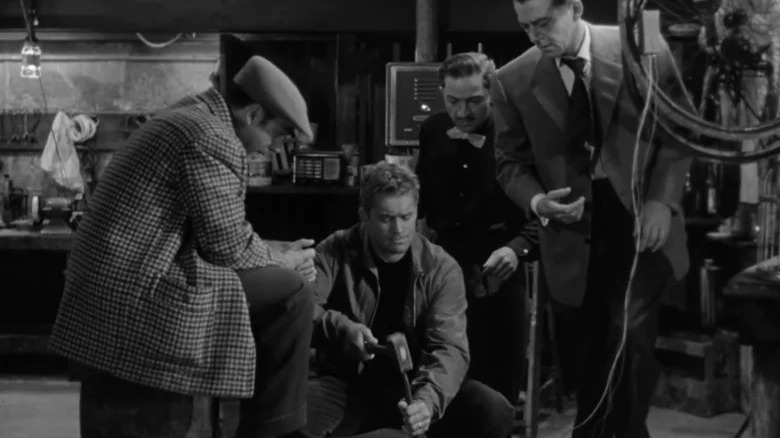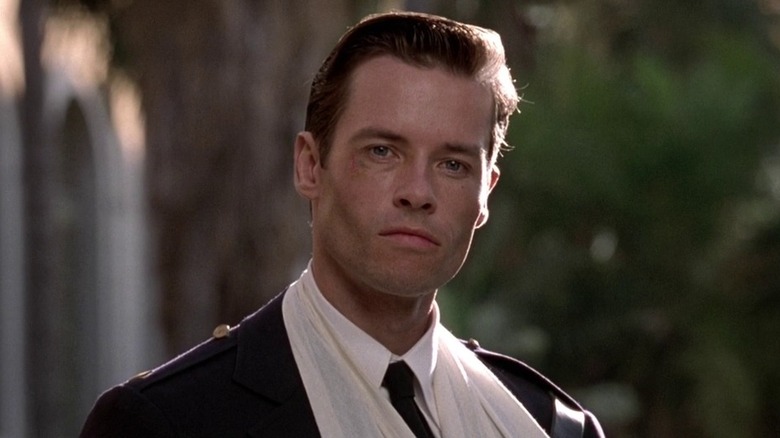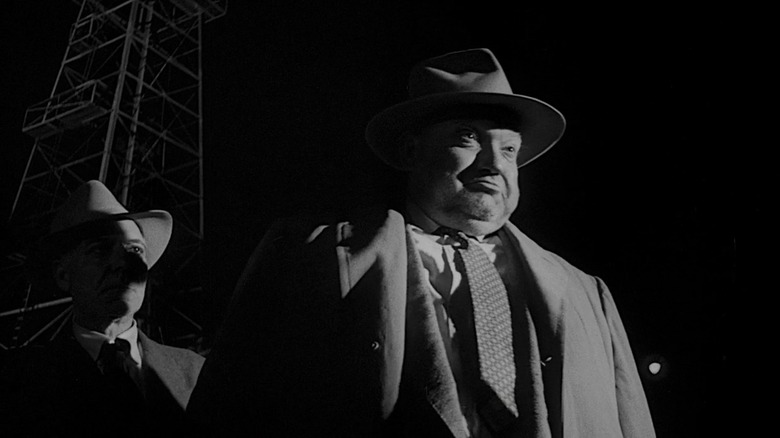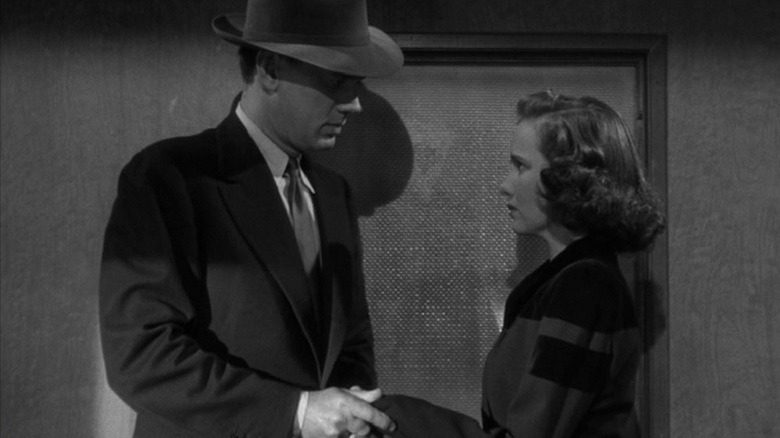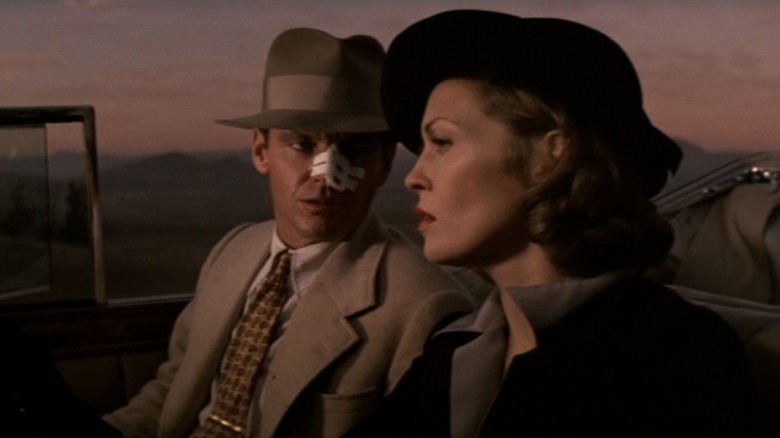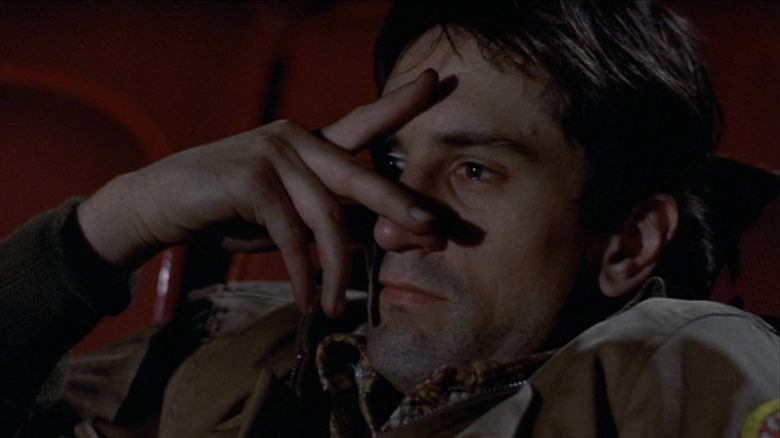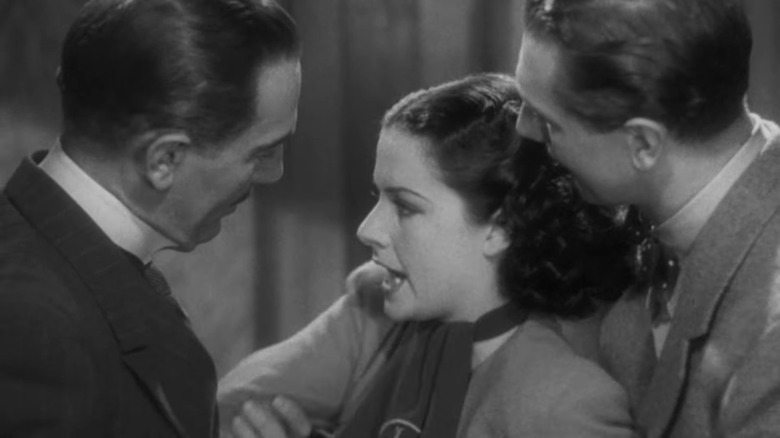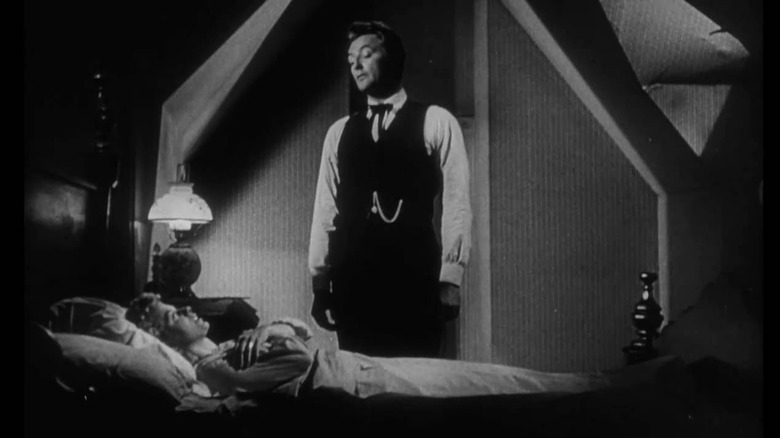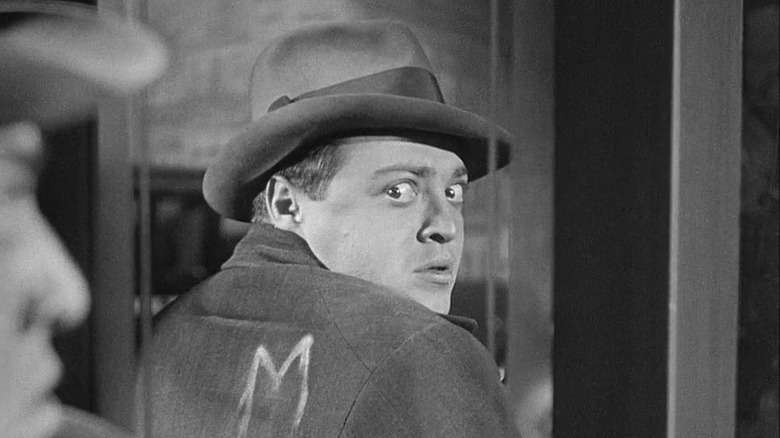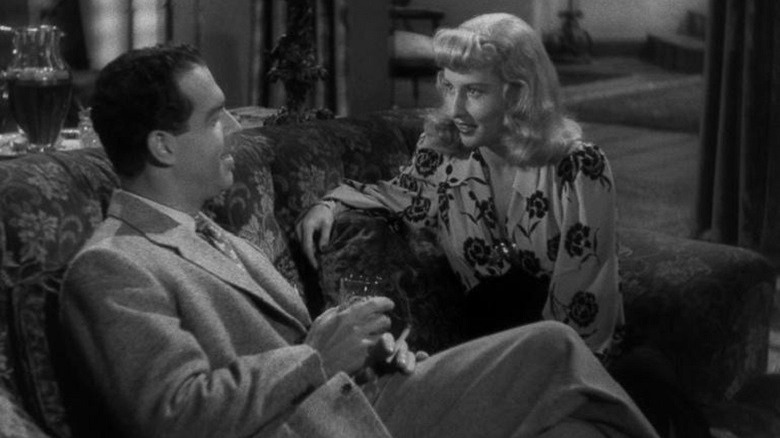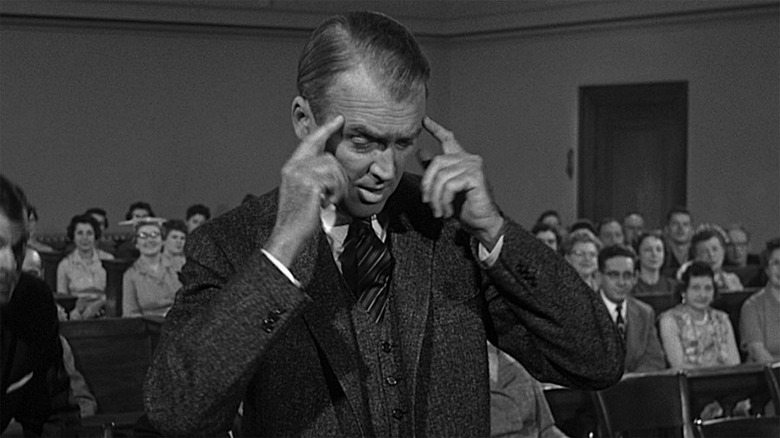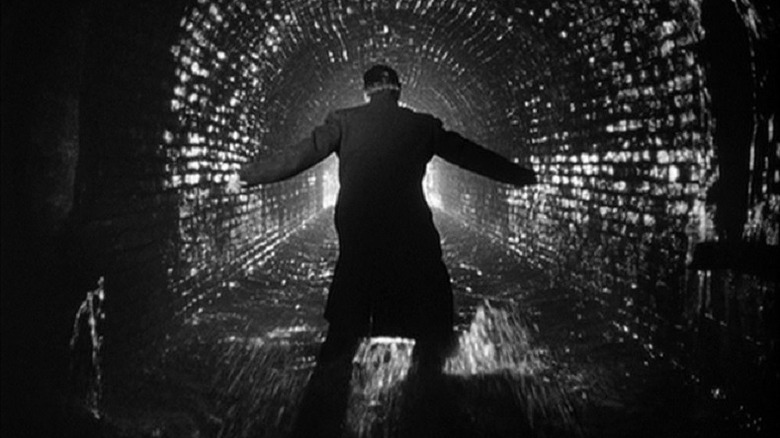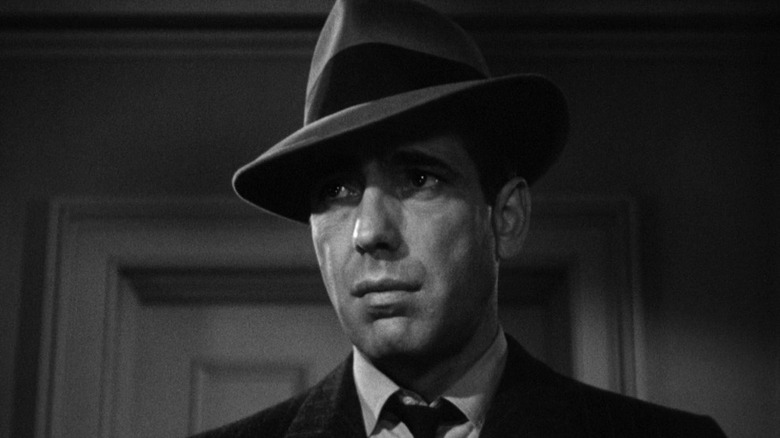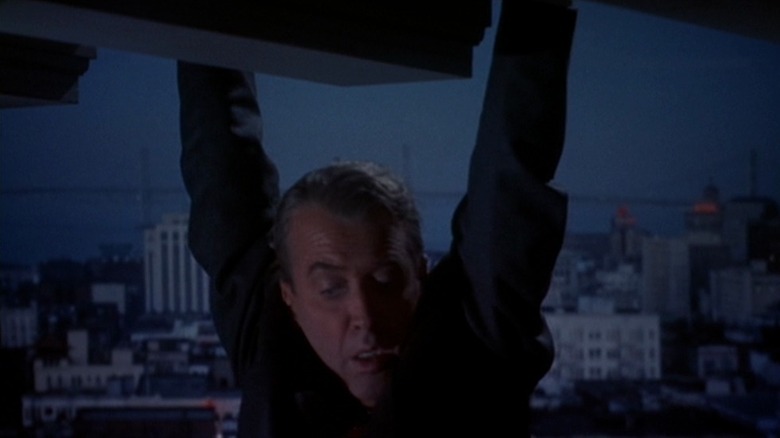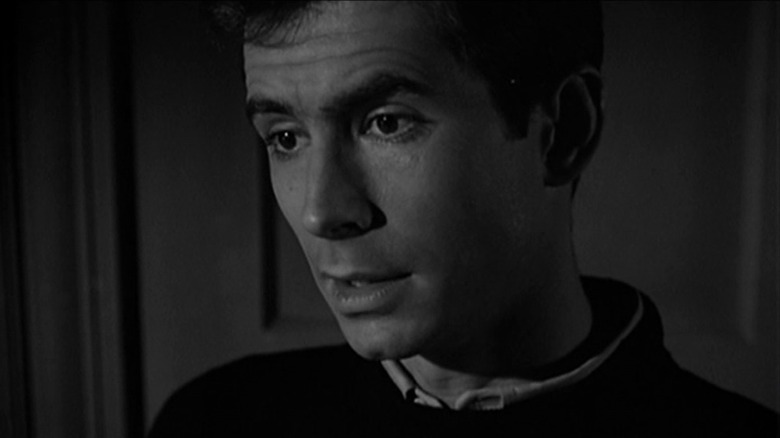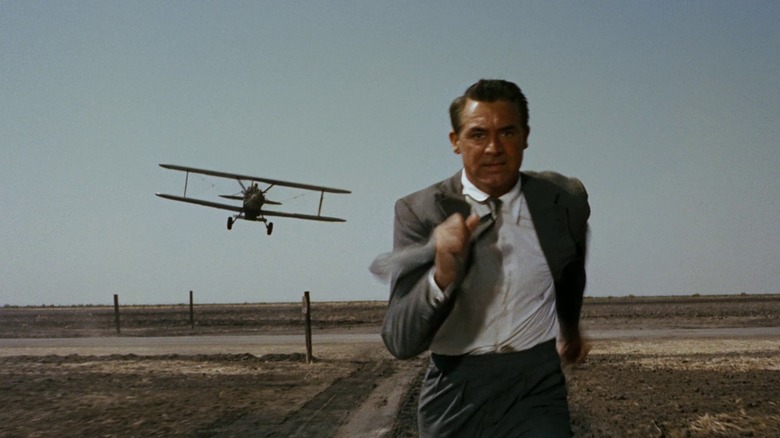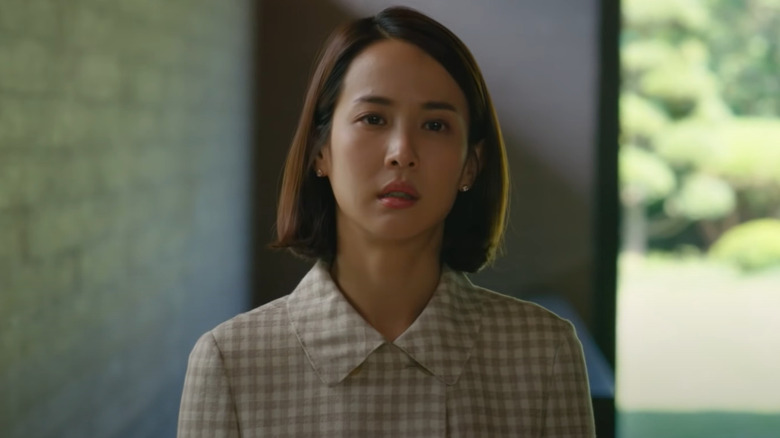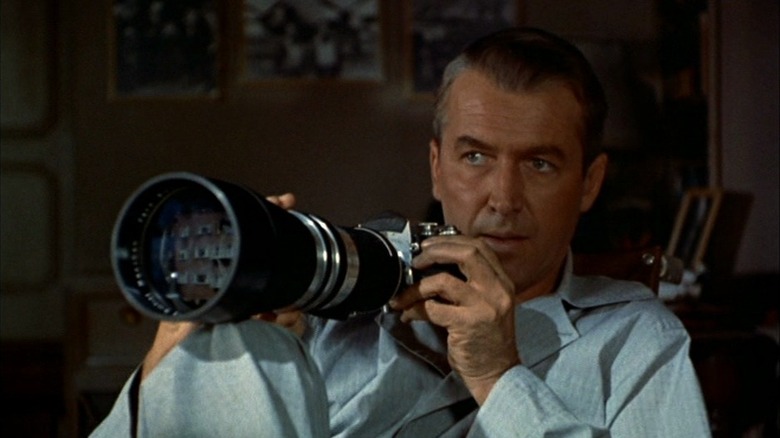95 Best Suspense Movies Of All Time Ranked
Few things can beat that feeling when a movie has you completely under its spell — simultaneously making you desperate to see what happens next while also fearful of what that might be. Suspense or thriller movies offer this veritable knife-edge sensation, with perfectly timed reveals, moments of often uncomfortable silence, and the ability to keep you guessing until the opportune moment when everything comes crashing down.
From the Master of Suspense, Alfred Hitchcock, to a recent Oscar-winning sensation, the genre is the gift that keeps on giving and ensures that movie fans keep coming back for more. The beauty of suspense films is that they can take place anywhere at any time, playing with a variety of subgenres including political, war, noir, Westerns, and horror in order to keep things fresh.
Some suspense films favor the all-out assault on the senses, resulting in relentless white-knuckle thrills, while others adopt more of a slow-burn approach, gently luring audiences in with layers of tension and a series of flawlessly placed revelations. The best suspense films are sometimes best entered into knowing as little as possible so beware of spoilers that might lie ahead as we have a look at some of the very best suspense movies out there.
95. Enemy of the State
In the '90s, Will Smith was a hugely bankable box office star, and this political action thriller sees him as lawyer Robert Dean, who becomes the target of the National Security Agency when he inadvertently acquires a key piece of evidence showing the murder of a high-profile congressman. Now perceived to be the enemy, Dean enlists former intelligence agent Edward "Brill" Lyle (Gene Hackman) to help him uncover the web of conspiracy and clear his name.
Nestled between "Men in Black" and "Wild Wild West," it's refreshing to see Smith take on a more serious and challenging role, and he easily holds his own alongside acting heavyweights Jon Voight and Gene Hackman. Perhaps it's due to the presence of Hackman, but in many ways, "Enemy of the State" feels like a companion piece to 1974's "The Conversation," with both films having a shared theme of surveillance. In his review for Sight & Sound, film critic Kim Newman even called it a "continuation of 'The Conversation'" and that Hackman's appearance "provides a welcome physical link to what went before."
94. The Machinist
In this dark thriller, Christian Bale transforms into machinist Trevor Reznik, an insomniac riddled with paranoia who begins to experience terrifying delusions. The sight of an emaciated Bale — who lost more than 60 pounds for the role (via The Huffington Post) — would be stark enough on its own, but the film matches his unnerving performance with jarring imagery and hallucinatory elements.
The suspense builds throughout "The Machinist" as we start to wonder what's real and what's being created by Reznik's fractured state of mind, with the chilling uncertainty this creates being incredibly effective. "The Machinist" is admittedly bleak, but the bittersweet ending is one that offers unexpected comfort and resolution for the guilt-ridden and sleep-deprived Reznik. Bale remains the highlight of the film, and his committed, harrowing performance guides us through this nightmarish world.
93. The Game
Another intriguing and multi-layered thriller from David Fincher, "The Game" tells the story of wealthy banker Nicholas van Orton (Michael Douglas), who's gifted a mysterious present from his brother (Sean Penn) — a game with the power to change his life from a company called Consumer Recreation Services. Attracted by the prospect, Nicholas becomes involved in a psychological and twisted series of events where it becomes increasingly harder to distinguish what's real and what's part of the supposed game.
Fincher's ability to craft an atmospheric story and Michael Douglas' standout performance are ultimately what elevates this film — playing to the paranoia and uncertainty as we're also left perplexed by what's part of the game and what isn't. "The Game" is full of surprises, and while you may see some of them coming a mile away, the sense of mystery that the film creates never diminishes the suspense and the messed-up fun in watching the way things play out.
92. Nocturnal Animals
In "Nocturnal Animals," Amy Adams delivers a stunning performance as Susan Morrow, the owner of an art gallery who reflects on the relationship with her ex-husband (Jake Gyllenhaal) while reading his latest novel. The book is dedicated to Susan, but she's shocked to discover its violent and devastating contents, as well as her ex's motivations in writing it for her.
There are two stories that run in parallel in "Nocturnal Animals," with the glossy world of Susan contrasting with the dark and gritty novel that's brought to life as she reads it. There's increasing overlap between the novel and the real world — with Jake Gyllenhaal crossing over between both stories — creating a level of intrigue and a sense of the lines blurring as we wonder how much of the novel is based on truth or not. As the second directorial effort from fashion designer Tom Ford, "Nocturnal Animals" is at times beautiful and aesthetically pleasing, something that provides a shocking juxtaposition with the dark and sinister story.
91. Sorcerer
The most effective remakes are the ones that pay homage and yet manage to be entirely different, and this remake of 1953's "The Wages of Fear" is one such film. While the story is very similar — involving the treacherous transportation of some very volatile explosives — the execution is completely different, and somehow, director William Friedkin managed to find new ways of shredding your nerves to pieces.
The first difference is evident from the beginning, with our characters introduced in a series of vignettes before they even arrive in the desperate Colombian village. Establishing what brought each character to this place is an important detail as it adds something to our understanding of why they would undertake this suicide mission. The most nail-biting moment of the film comes when the explosive-carrying trucks have to cross a very unstable-looking bridge. It's one of those moments you'll be watching through your fingers, but you won't be able to look away from it. In other words, it's the perfect showcase of this hugely underrated film's power.
90. The Parallax View
In the wake of the Kennedy assassination, "The Parallax View" offered a timely, paranoid thriller about a reporter investigating an organization that targets political figures. Joe Frady (Warren Beatty) is informed by ex-girlfriend and television journalist Lee Carter (Paula Prentiss) that witnesses to the assassination of a presidential candidate three years prior are being targeted. While Frady is initially skeptical, when Carter is found dead, he has no choice but to try and discover the truth.
"The Parallax View" could be seen as an effective companion piece to another film from director Alan J. Pakula, "All the President's Men," which came two years later. After all, both films feature reporters' quest for the truth amidst stories of political conspiracy theories and paranoia. With "Klute," as well, Pakula certainly proved his deftness in directing taut suspense thrillers, and the charismatic performance from Beatty as the investigative journalist makes "The Parallax View" an enjoyable and thrilling film.
89. The Sixth Sense
Director M. Night Shyamalan's movies are well-known for their twists and turns, but arguably the greatest of them all is still the shocking reveal in "The Sixth Sense." Beyond that and the unforgettable quotes, the film is an incredibly effective psychological thriller that creates a deeply unsettling tone through the vulnerability of the young Cole Sear (Haley Joel Osment), who's tormented by ghostly apparitions.
The most effective suspense films will be the ones that know the perfect moment to reveal key pieces of information to the audience. While clues are scattered like breadcrumbs throughout "The Sixth Sense," the legendary revelation is no less devastating and chilling. While it acts as the pressure release valve, it wouldn't be anywhere near as effective if it weren't for the exceptionally tense atmosphere that's been so effectively established.
88. Prisoners
Denis Villeneuve's dramatic thriller tells the story of a desperate father, Keller Dover (Hugh Jackman), who takes matters into his own hands when his daughter is one of two young girls abducted. Alongside this, Detective Loki (Jake Gyllenhaal) heads up the investigation and pursues multiple leads, although he doesn't appear to have a lot of information to go on. The question arises of whether either man will discover the person responsible and how far Dover will go to find his daughter.
With an emotionally charged plot, "Prisoners" successfully builds a mounting sense of dread, with Jackman's frantic father resorting to disturbing tactics when he imprisons the prime suspect (Paul Dano). As well as the powerful performances from the two leads, the film also features some memorable supporting performances with Viola Davis and Terrence Howard equally great as the parents of the other missing girl. The difficult subject matter and scenes of torture make "Prisoners" a disturbing watch at times, however, it's an incredibly effective, well-acted, and beautifully shot thriller.
87. Collateral
With a rare, villainous performance from Tom Cruise, "Collateral" sees him play Vincent, a hitman who forces a hard-working Los Angeles cab driver, Max (Jamie Foxx), to drive him around the city on his killing spree. Directed by Michael Mann, "Collateral" is a stylish neo-noir thriller that keeps things simple, but it still manages to amp up the tension as it explores how far an ordinary man will be pushed when caught up in something unimaginably horrible.
The sense of danger and the steady building of suspense is keenly felt throughout the film and wonderfully conveyed through Foxx's nuanced performance. He succeeds as being a believable and likable everyman — someone we want to root for right from the start. With much of the film taking place over one night, Foxx also perfectly demonstrates the feeling of exhaustion as the hours wear on, and his varied performance was enough to earn him an Oscar nomination for best supporting actor.
86. Seven
From its memorable and endlessly quotable conclusion to the arresting images of the truly grisly crimes, "Seven" is a film that has the power to stay with you for a long time after. David Mills (Brad Pitt) and William Somerset (Morgan Freeman) are detectives at opposite ends of their careers, with one bringing idealistic exuberance and one the world-wearied experience to the investigation into a serial killer who appears to be working his way through the seven deadly sins in his memorable kills.
Even for a film released in 1995, the gore effects in "Seven" are impressive, and they still hold up to this day. As the detectives investigate each crime scene and the creative interpretations of the seven deadly sins, a palpable sense of dread builds, and as much as you might think you would become desensitized as the film progresses, each one seems to be more shocking than the last. In addition to the strong work from Pitt and Freeman, Kevin Spacey delivers an outstanding performance as the cold, calculating, and impenetrable villain, John Doe.
85. The Talented Mr. Ripley
This beguiling, seductive, and stylish thriller sees the titular Tom Ripley (Matt Damon) sent to Italy by a wealthy magnate to persuade his errant son, Dickie (Jude Law), to come back home. Upon meeting Dickie, Tom becomes dangerously obsessed with him and his lavish lifestyle, resulting in a complex tale of duplicity and murder.
Beginning with a borrowed Princeton jacket, Tom's proficiency at spinning lies and assimilating other identities makes him an instantly captivating character, and the lush, sunny Italian vistas provide a stark contrast to Tom's dark and sinister actions. Damon's performance is quietly unnerving, and as the film progresses, his unassuming nature is the perfect disguise for his sociopathic qualities. And as Tom's deception grows deeper and deeper, the film becomes more and more intense, and this is something that lingers long after the film finishes with the ambiguous open-ended conclusion not necessarily offering the resolution you might have expected.
84. The Invisible Man
Bringing a fresh and modern take on the classic H.G. Wells story, 2020's "The Invisible Man" bears little to no resemblance to the 1933 sci-fi film. This time, the focus is on Cecilia Kass (Elisabeth Moss), a woman trapped in an abusive relationship, who manages to escape but subsequently finds she's being stalked by a seemingly invisible figure. Adopting some powerful themes and focusing on the mistreatment of women brings a completely different perspective to the classic monster movie, proving that sometimes all it takes is the bare bones of the story and a new angle to deliver an innovative and exciting remake.
Leaning more into the horror than the science fiction elements, "The Invisible Man" is undeniably scary but also emotional, with Elisabeth Moss' powerful performance keeping the plot grounded. Where elements of the film could've become farcical, Moss manages to sell it completely, making us empathize with her character and allowing her to carry us through the plot involving high-tech invisibility suits and plenty of twists and turns.
If you or someone you know is dealing with domestic abuse, you can call the National Domestic Violence Hotline at 1−800−799−7233. You can also find more information, resources, and support at their website.
83. Promising Young Woman
This debut film from writer and director Emerald Fennell is one that manages to surprise, shock, and provoke, right through to the closing moments. Cassandra (Carey Mulligan) is a young woman who takes the trauma of her past and uses it to get revenge. By night, she turns the tables, luring predatory men in and then making them pay for their inappropriate actions. Her main motivation is to avenge her college best friend who was sexually assaulted and subsequently took her own life when the school failed to act.
"Promising Young Woman" handles its difficult subject matter exceptionally well, bringing a razor-sharp edge to the rape-revenge thriller. Its exploration of the issue feels incredibly timely given its coincidence with the #MeToo movement, and it succeeds in being both provocative and thought-provoking. The thrill of the film is not only in watching it unfold — some of which is deeply uncomfortable — but also in watching the aftermath, as the conclusion is one of the best movie endings in recent memory.
If you or anyone you know has been a victim of sexual assault, help is available. Visit the Rape, Abuse & Incest National Network website or contact RAINN's National Helpline at 1-800-656-HOPE (4673).
82. Inside Man
Spike Lee's slick heist thriller focuses on Dalton Russell (Clive Owen), an experienced criminal who attempts to pull off the "perfect" heist. But despite every detail being accounted for and always managing to stay one step ahead of the law — even with the best efforts of NYPD negotiator Detective Keith Frazier (Denzel Washington) — things take an even more interesting turn when the bank's founder (Christopher Plummer) asks power broker Madeleine White (Jodie Foster) to protect something in the bank from the criminals.
For a Spike Lee joint, "Inside Man" plays things surprisingly straight, but that's not to say it isn't tremendous fun, and it's great to see the director giving his take on a genre film. The idea of a criminal who's too clever for his own good and so effectively evades capture gives a different perspective to the heist movie genre. Even with the mastermind calling it the perfect heist, our expectations of the genre are that something always goes wrong, and in our anticipation that this is inevitably going to happen here, we're kept in suspense waiting for it to happen ... but will it?
81. Searching
Following the death of his wife, David Kim (John Cho) devotes himself to his occasionally distant teenage daughter, Margot (Michelle La). When he's unable to get hold of her, Daniel begins a desperate search, trawling through her social media accounts for clues to get to the bottom of her disappearance.
"Searching" is a thoroughly modern thriller in which the action unfolds entirely through screens, emails, and messages. The opening montage — not dissimilar to the heartbreaking opening of Disney's "Up" — is not just emotionally affective but helps to settle us into this film's unique storytelling method. What could feel like a gimmick actually becomes an ingenious narrative device, exploring the help and hindrance that technology can play in our lives. Rather than feeling restrictive, this use of screens to tell the story helps ratchet up the tension, giving the feeling that we're watching the events unfold in real-time.
80. Ex Machina
Caleb Smith (Domhnall Gleeson) is a programmer for tech company Blue Book, who wins a contest to visit the home of reclusive company owner, Nathan (Oscar Isaac). However, when he arrives, he learns the contest was a ruse and the real purpose for him being there is to conduct the Turing test on humanoid robot, Ava (Alicia Vikander), to determine whether she's capable of human thought.
"Ex Machina" is slick, stylish, and intelligent sci-fi that also manages to achieve huge amounts of tension through its scarily plausible exploration on the potential for artificial intelligence. The luxurious, technologically advanced home belonging to Nathan is the perfect setting, with the sense of isolation also increasing the levels of danger. Forcing the audience to question everyone's motives and posing many ethical and moral dilemmas, "Ex Machina" is a stark reminder of the beauty and the risk in technological advancement, and in its probing of the "Blade Runner"-esque question of what being human means, it provides much food for thought.
79. The Untouchables
Anchored by Robert De Niro's larger-than-life performance as legendary mobster Al Capone, Brian De Palma's iconic crime film plays fast and loose with the truth, but what it lacks in historical accuracy, it more than makes up for in thrills. With Capone's crime network ruling over Prohibition-era Chicago, federal agent Eliot Ness (Kevin Costner) works with veteran Jimmy Malone (Sean Connery) to form a team to bring him down.
The story may be a classic tale of the good guys trying to take down the bad guys, but its the fun performances that elevate "The Untouchables," with De Niro conveying a genuine nastiness and theatrical side to Capone and Connery's grizzled, world-weary officer providing the driving force of the opposition. The film may not be too bothered with developing these characters more than necessary, but with lavish production design and plenty of dramatic shoot-outs, "The Untouchables" thrives in its sense of stylish spectacle.
78. You Were Never Really Here
With nods to Martin Scorsese's "Taxi Driver" in its depiction of a trouble loner, Lynne Ramsay's blistering psychological thriller follows Joe (Joaquin Phoenix), an enforcer of undisclosed authority, who's sent to rescue an underage girl that has been kidnapped by sex traffickers. Haunted by the visions of his own childhood abuse, Joe is deeply troubled and appears to be constantly teetering on the brink of psychosis.
As Joe, Phoenix is an imposing screen presence, creating an unnerving feeling with the contrast between the character's dissociative tendencies and his frequent violent outbursts. Both the sound design and the score perfectly match this duality, with the silence often punctuated with deafening bursts of noise and chaos, coupled with Jonny Greenwood's jarring and eerie score contributing to that constant sense of unease. "You Were Never Really Here" packs a lot into a relatively short amount of time, and with each frame carefully considered by Ramsay, it never feels like a second is wasted.
If you or anyone you know has been a victim of sexual assault, help is available. Visit the Rape, Abuse & Incest National Network website or contact RAINN's National Helpline at 1-800-656-HOPE (4673).
77. Eye in the Sky
Starring Helen Mirren as Colonel Katherine Powell, and notable for being the last live-action performance from Alan Rickman, "Eye in the Sky" is a taut, exciting, and timely modern warfare thriller. Colonel Powell leads a drone mission to capture terrorists operating in Kenya, but when an innocent girl becomes dangerously close to the area they're about to strike, she must negotiate with world leaders to determine the next course of action.
The story being told predominantly through tense phone conversations and diplomatic discussions might not sound like the most thrilling way to tell this tale, but somehow it works, exploring the challenges and moral dilemmas that arise in warfare. The question of whether one person's life is more important than the potential mass loss of life (if the terrorists were allowed to escape) provides the film with an interesting angle, as it delves into the political, legal, and emotional ramifications of drone strikes.
76. Oldboy
With a perfectly timed stomach-churning reveal later in the film, this Korean neo-noir from Park Chan-wook remains as powerful today as it was when it was released in 2003. "Oldboy" tells the story of Oh Dae-su (Choi Min-sik), kidnapped and imprisoned for 15 years, who — following his release — tries to find the identity of the person who held him captive. On this one-man revenge mission, he also encounters the beautiful sushi chef, Mi-do (Kang Hye-jung), who he becomes romantically involved with.
"Oldboy" is a brutal and brilliant thriller, featuring possibly the greatest one-shot action sequence of all time, as Oh Dae-su fights his way through a hallway filled with enemies, armed only with a hammer. Driven by the strong performances — particularly that of Choi Min-sik — "Oldboy" is violent, visceral, uncompromising, and completely brilliant, perfectly balancing the moments of intense brutality with the powerful and rich storytelling. It's an uncomfortable watch in places, yet it's a film you'll keep coming back to again and again.
75. Misery
The star of this Stephen King adaptation about an obsessive fan who holds her favorite author captive is undoubtedly Kathy Bates, whose demented performance as Annie Wilkes won her the Oscar for best actress at the 63rd Academy Awards. Equal parts funny, mad, and frightening, "Misery" gleans tension from the slowly unfolding horror of the situation as James Caan's Paul Sheldon is rendered completely helpless.
Any film that has a sense of claustrophobia to it immediately ratchets up the tension, and with an injured Sheldon at the mercy of "Mad Annie," the tone veers wildly and wonderfully between comedy and abject terror. As well as being one of the few adaptations of his novels that King actually enjoys, the legacy of "Misery" has seen Annie immortalized on the AFI's best villains list, where she placed 17th. Featuring a host of memorable moments including the wince-inducing "hobbling" scene, "Misery" perfectly translates the tone of King's book to the big screen, and more than 30 years later, it still makes an impact.
74. Zodiac
Based on the true story of the Zodiac killer — a serial murderer who befuddled journalists and the police with his cryptic clues and messages — "Zodiac" is a suspenseful and thorough procedural thriller starring Jake Gyllenhaal, Mark Ruffalo, Anthony Edwards, and Robert Downey Jr. Despite the weighty runtime of 157 minutes and dialogue-heavy story, "Zodiac" effectively conveys the overwhelming feeling of dread and foreboding as the investigators obsess over the details of the intriguing case.
Equally obsessive over the finer points of the case is director David Fincher, with the accuracy and almost clinical attention to detail in the film giving it a gritty, lived-in realism. The sense of frustration as the investigators mull over the impenetrable clues is palpable, and while the case itself was a puzzle, the film manages to make sense of the overwhelming amount of detail in the thorough way it tells the story. Chicago Sun-Times critic Roger Ebert was particularly blown away by the nuances of the film saying, "Its most impressive accomplishment is to gather a bewildering labyrinth of facts and suspicions over a period of years and make the journey through this maze frightening and suspenseful."
73. Black Swan
Centered around a production of Tchaikovsky's "Swan Lake" ballet, "Black Swan" focuses on dancer Nina (Natalie Portman), whose pursuit of perfection pushes her to the brink. and in the midst of a tense rivalry with new company member, Lily (Mila Kunis), Nina begins to descend into paranoia and madness. With any Darren Aronofsky film, you can expect a certain degree of surrealism and melodrama, and "Black Swan" has this in abundance, with the dramatic music from Tchaikovsky's ballet rarely sounding more intense.
The unravelling of Nina is frightening and beautiful in equal measure, with the film's dreamlike quality encouraging us to question what is real and what isn't — something that becomes harder to determine as the tale progresses. "Black Swan" often feels like watching a car crash in slow motion, and whether it's the pressure from her overbearing mother or the demands she puts on herself as she obsesses over being perfect, there is the constant, sickening feeling as we're watching Nina spiral that nothing could be done to stop it.
72. Widows
Based on the British television series of the same name, "Widows" features an incredible ensemble cast including Viola Davis, Michelle Rodriguez, Elizabeth Debicki, and Cynthia Erivo. Plus, it boasts a uniquely emotional angle on the heist movie genre. When their husbands are killed in a failed robbery, four women inherit their husband's debts and the attention of crime boss Jamal Manning (Brian Tyree Henry) and his dangerously violent brother, Jatemme (Daniel Kaluuya). With no choice, the women are forced to carry out a heist of their own.
Heist thrillers lend themselves to high levels of suspense, and "Widows" is no different. However, there's an undeniable grittiness and sadness to "Widows," as their grief weighs heavily on them, and the heist isn't something they are choosing to do but something they feel they have to do. This emotional layer makes "Widows" an exceptionally powerful film, and giving such meaning to their actions makes it feel even more intense as we're so desperate for them to succeed.
71. Blow-Up
While very much rooted in swinging '60s London, "Blow-Up" is a film that still has something to say, particularly regarding our consumption and perception of media. Thomas (David Hemmings) is a fashion photographer who spends most of his days surrounded by the beautiful, scantily clad women he photographs. One day, however, it appears Thomas' lens has captured a possible murder, and things take an intriguing turn when one of the subjects in the photo arrives at his studio.
There are shades of "Rear Window" in "Blow-Up," particularly in the idea of a character witnessing something that they shouldn't and the passivity of seeing something you're helpless to stop, but ultimately, the films go in two very different directions. There is a hypnotically meandering quality to "Blow-Up," and while there are suspenseful elements, it's much more reflective and existential than it appears on the surface. Director Michelangelo Antonioni perfectly captures not just the aesthetic of this decade but the feeling of languor and disinterest in the youth subcultures at the time, resulting in a unique time capsule experience.
70. Thief
Based on a 1975 novel by Frank Hohimer, "Thief" marks the feature film debut of director Michael Mann, who would go on to direct other action thrillers such as "Heat" and "Collateral." The film stars James Caan as safecracker Frank, who's desperate to escape the criminal world and settle down with his wife, Jessie (Tuesday Weld). But first, he decides to pull off one final heist. While there are plenty of films in the heist genre that focus on the "last hurrah," there's a palpable sense of danger in "Thief" and a philosophical side to Frank's character that acknowledges the potential finality of the job.
With neo-noir inflections, "Thief" is a slick, stylish, and well-paced thriller, with arguably one of the best performances of James Caan's career. It's easy to paint the characters as one-dimensional and focus more on the action in films like this, but there's a genuine sense of pathos to the characters that makes for a much more well-rounded and fulfilling movie. Also featuring a distinctly '80s electronic score from Tangerine Dream, "Thief" is a film that set the bar very high for Michael Mann and proved he'd be one to watch when it came to suspense-filled thrillers.
69. Duel
Four years before he made a film about three men and a shark, Steven Spielberg made this nail-biting thriller about one man and a truck — perfectly setting the scene for the stratospheric direction his career was about to go. Playing on a very real situation — involving a tailgating truck driver — Spielberg heightens the tension by never showing us the faceless person behind the wheel of the truck.
"Duel" also uses very little dialogue, which only adds to the suspense as our imagination is left to fill in the gaps. This idea is used even more so in "Jaws," with Spielberg demonstrating an acute understanding that there is greater fear in the things we don't see rather than the things we do. "Duel" is a compact cat-and-mouse thriller that rarely relents on the tension, and it demonstrates perfectly what an audacious and fearless filmmaker Spielberg was in the early stages of his career.
68. Caché
Alfred Hitchcock made a career exploring the idea of voyeurism in his movies, and Michael Haneke's "Caché" takes this theme and delivers it with a fresh and modern twist. Georges (Daniel Auteuil) and Anne (Juliette Binoche) are a wealthy couple who find their lives turned upside down when some anonymous tapes — suggesting they're under surveillance — begin to arrive at their home. Where films such as "The Conversation" and "Blow Out" rely heavily on the theme of surveillance, they explore the idea of looking at something, whereas "Caché" delves into the terrifying notion of being watched.
Beautifully executed and with impeccable performances from the two leads, "Caché" has an unsettling feeling of ambiguity to it, making for a very different kind of "whodunnit." The matter of who is watching them becomes tangential to even the thought that someone could be watching, leading the characters to admissions and revelations they never would've considered before. Haneke's film thrives on the idea that everyone harbors a sense of guilt about their past and pairing this with the very human fear of being watched results in a highly effective thriller.
67. Gone Girl
Full of twists, surprises, and deceitful characters, 2014's "Gone Girl" — based on the book of the same name by Gillian Flynn — focuses on Amy Dunne (Rosamund Pike) whose mysterious disappearance results in the finger of blame being pointed at her husband, Nick (Ben Affleck). But as you'd imagine, all is not as it seems.
Multi-layered and endlessly complex, Amy Dunne is one of the all-time great characters, managing to keep her presence felt even when she's absent. Ultimately, all things come back to her, and whether it's the mystery of her disappearance, her reappearance, or her motivations, she's an enigmatic figure, and Rosamund Pike's extraordinary performance manages to convey her multi-faceted personality. In the hands of such an unreliable and thorny narrator, there's a sense of creeping dread that there are in fact no innocent parties, and the idea that these characters may just continue to psychologically torture each other is a chilling concept.
66. The Taking Of Pelham One Two Three
Based on the novel by John Godey, "The Taking Of Pelham One Two Three" follows a group of color-codenamed criminals as they hijack a New York City subway car, threatening to kill a passenger every hour unless they receive $1 million, all while police lieutenant Zack Garber (Walter Matthau) desperately tries to negotiate with them and stop the train.
Despite the criminals masquerading under codenames — something Quentin Tarantino paid homage to in "Reservoir Dogs — the character development is surprisingly strong, and Robert Shaw in particular is exceptional at inhabiting former Army man Mr. Blue/Bernard Ryder. Full of action and suspense — exacerbated by the contained and claustrophobic setting of the subway train — "The Taking Of Pelham One Two Three" is a fast-moving and frantic experience with a sharp wit and sizzling dialogue. While it isn't as widely recognized as other gritty '70s thrillers such as "The French Connection" or "Chinatown," it's still an entertaining example of the genre that is well worth your time.
65. Mulholland Drive
David Lynch's surreal neo-noir "Mulholland Drive" sees aspiring actress Betty Elms (Naomi Watts) befriend amnesiac "Rita" (Laura Elena Harring) — the sole survivor of a car accident on the titular road. What initially appears to be a straightforward mystery, as the two search for clues to try and piece together Rita's true identity, becomes something altogether more strange and dreamlike.
It isn't surprising to learn that "Mulholland Drive" was hugely divisive with critics, with Rex Reed for The New York Observer calling it, "incoherent garbage" while Rolling Stone's Peter Travers named it "one of the best films" of 2001. Whichever side you come down on, there is certainly no denying that "Mulholland Drive" is unique, and its unconventional narrative — exploring the idea of re-invention and identity — gives the film its indefinable quality. With little explanation offered by the film itself, "Mulholland Drive" is open to multiple interpretations, and the genius of the film is you'll probably come to a completely different conclusion each time you watch it.
64. Infernal Affairs
Remade four years later by Martin Scorsese as "The Departed," "Infernal Affairs" is the first of a trilogy exploring the Triads of Hong Kong as two men go deep undercover. Lau Kin-ming (Andy Lau) works for the notorious Triad boss Hon Sam (Eric Tsang) and is tasked with infiltrating the police force, while Chan Wing-yan (Tony Leung) is a young police cadet given a special assignment to operate as a mole within Hon's operation.
More so than Scorsese's film, "Infernal Affairs" achieves its high levels of tension by going down the route of an intelligent and involving character study, particularly of the two undercover operatives. There are all the usual thrills, chases, showdowns, and moments of violence that you would expect, but there's also an emotional complexity as Lau Kin-ming and Chan Wing-yan struggle to face their own identities, represented by each other through their undercover guises. When a story is this strong, it almost doesn't matter how many different versions there are, and in the case of "Infernal Affairs" and "The Departed," each brings something different to the table, resulting in films that can easily stand on their own merit.
63. Cape Fear
While the 1991 remake featured the incredible performance from Robert De Niro as the deranged Max Cady, the 1962 version leans much more into the suspense, with the stark black-and-white photography making it even more frightening. The story focuses on lawyer Sam Bowden's (Gregory Peck) family, who are relentlessly stalked by Cady (Robert Mitchum), the man Bowden was responsible for putting behind bars.
Across the board, the performances are great, but we've gotta give a particular mention to Mitchum as Max Cady, who effectively conveys the danger Cady's presence signifies in each frame. The creepy score from Bernard Herrmann — who also composed the iconic music for "Psycho" — uses similar screeching and dissonant strings to the Hitchcock classic to put us in the villain's chaotic mind, and it's undeniably effective. The film earned some controversy for the way it depicts the threat of sexual assault, but as distressing as these moments are, they successively demonstrate just how despicable a character Max Cady is.
If you or anyone you know has been a victim of sexual assault, help is available. Visit the Rape, Abuse & Incest National Network website or contact RAINN's National Helpline at 1-800-656-HOPE (4673).
62. Drive
Far from the action-packed and stunt-heavy "Fast and Furious" films, "Drive" is a very different breed of thriller, with a neo-noir feel and moments of quiet serenity interspersed with brutal outbursts of violence. Ryan Gosling plays an unnamed stunt driver by day/getaway driver by night whose involvement with his neighbor, Irene (Carey Mulligan), quickly escalates into violence when her husband (Oscar Isaac) is released from prison.
Nicolas Winding Refn's slick direction creates a tangible sense of atmosphere throughout the film, and the quiet, restrained performance of Gosling provides the calm facade that makes the violence even more shocking. "Drive's" ruthless and cold exterior effectively establishes the mood that becomes essential to the way the rest of the film unfolds, and while it makes the movie feel a little impenetrable at times, its morally ambiguous characters and motives are instrumental in creating the carefully calculated sense of tension.
61. Gaslight
Following the death of her aunt, Paula (Ingrid Bergman) moves to Italy where she meets and falls in love with pianist Gregory Anton (Charles Boyer). When they return to London, Paula is keen to lock away the reminders of the trauma that the house holds for her and begin a new life. However, when things start to go missing and strange noises are heard, she begins to question her own sanity and whether her husband has her best interests in mind.
The term "gaslighting" is now common in our lexicon, and it's thanks to this film that the term even exists. "Gaslight" is a methodical and chilling thriller that effectively explores the horrors of psychological torture — something that's even more unsettling given that it's the actions of a manipulative husband against his troubled wife. Charles Boyer is excellent as the charming and evil Gregory, but Ingrid Bergman is the star of the show, demonstrating believable anxiety and fear and, later, subtle defiance that truly pays off in the closing moments.
60. In the Heat of the Night
Starring the legendary Sidney Poitier, "In the Heat of the Night" is a thought-provoking thriller that manages to balance carefully orchestrated moments of suspense with its social commentary, resulting in a tense and powerful film. Virgil Tibbs (Poitier) is an African-American police detective mistakenly arrested on suspicion of murder by the racist police force of a small town in Mississippi. While he manages to persuade them of his innocence, Tibbs still has to fight against unfair discrimination as he tries to find the real murderer.
The performance of Sidney Poitier is the highlight of this film, and his defiant delivery of the famous line "they call me Mr. Tibbs!" is a moment that has lived on in cinema history. "In the Heat of the Night" also manages to effectively portray the personal and professional battles of Tibbs, with the dual layer of tension in his struggles against the antiquated views of the police force and his quest for the truth making for an unforgettable and compelling film.
59. Nightcrawler
With a lively performance from Jake Gyllenhaal at the center, "Nightcrawler" is a sleazy psychological thriller about a man called Louis Bloom, who leaves his life of petty theft behind him to make a quick buck as a cameraman. As he deliberately scours the streets of Los Angeles for the most shocking and grisly crimes, the depths Bloom will plummet to in order to get the scoop becomes distressingly clear.
As well as the unsettling physical transformation of Gyllenhaal as he embodies the scrawny and greasy Bloom, "Nightcrawler" shines an uncomfortable light on modern media consumption and the danger of placing sensationalism over storytelling. The character work here is key, and Louis Bloom is one of the great modern neo-noir characters — charming and sociopathic in equal measure, it's the kind of performance you can't look away from.
58. The Usual Suspects
The now infamous twist in the final act may be what cements "The Usual Suspects" as a masterful suspense thriller, but it should also be credited for the exceptional editing and direction leading up to this point. Without the film effectively laying the groundwork as it weaves its dense web of deceit and misdirection, the shocking reveal wouldn't be anywhere near as effective as it is.
As for the plot, when five seemingly unlinked criminals are arrested and brought together in a lineup, they decide to work together to plot their revenge against the police. When it appears that legendary criminal Keyser Söze is also connected with their operation, the race to find out the true identity of the criminal mastermind begins. Full of corruption, riddles, and unexpected turns even before the ending, "The Usual Suspects" is one of those suspense films that feels like a magic trick in the way it misleads and misinforms, and the conclusion demands a second watch just so you can look for those elusive clues.
57. Good Time
Two years before "Uncut Gems," the Safdie brothers were already proving they had what it takes to make a pulse-pounding thriller in this anxiety-fuelled crime drama. After a bank robbery goes awry, resulting in his brother Nick's (Benny Safdie) arrest, Connie (Robert Pattison) throws himself into the sleazy New York underworld to try and free him.
With shades of "Taxi Driver" and "Dog Day Afternoon," "Good Time" is a nervy, gritty film that uses the vivid neon of New York to hypnotizing effect. With much of the events taking place in one night, there is a real-time feel to "Good Time," which — coupled with the energetic performance from Robert Pattinson — makes for a wild and unbelievably tense ride. As well as their skill at crafting nerve-shredding thrillers, the Safdie brothers also demonstrate their ability to create sympathetic and well-crafted characters, and the central relationship between the two on-screen siblings has a wonderful authenticity to it.
56. Sicario
FBI agent Kate Macer (Emily Blunt) is assigned a high-profile and dangerous assignment, working with government official Matt Graver (Josh Brolin) and the elusive Alejandro (Benicio del Toro) on the Mexico border to find the cartel leaders responsible for the escalating war on drugs. "Sicario" is a tightly wound and thoughtful thriller, one that appreciates the importance of subdued moments interspersed with the more explosive scenes. At times, there's an eerie sense of quiet, making the tension feel at times unbearable, and when the release does come, it's even more impactful.
As well as effectively executing tension, "Sicario" also achieves something on a more visceral, emotional, and human level, demonstrating the toll on those working in a place that's not only dangerous but feels like victories are impossible to gain. Across the board, the performances are exceptional, with Emily Blunt a particular stand-out. Add to this the assured direction from Denis Villeneuve, the blistering score from Jóhann Jóhannsson, and the brutally beautiful cinematography from Roger Deakins, "Sicario" is a film that shatters all the senses.
55. Mother
10 years before "Parasite," director Bong Joon-Ho demonstrated his genre-bending prowess with the indefinable "Mother." The story focuses on the unnamed Mother (Kim Hye-Ja), who's pushed to take matters into her own hands when her mentally challenged son, Yoon Do-Joon (Won Bin), is accused of murdering a local girl. At times a family drama, at others a horror with a jet-black comedic edge, "Mother" is a unique and unpredictable cinematic experience.
As Mother's desperation to clear her son's name increases, the film goes to some pretty dark places, and the central mystery remains engrossing as we learn the truth about what actually happened. The performance of Kim Hye-Ja as the titular parent is particularly compelling, and the film makes time to explore her struggles of raising Do-Joon on her own and why she's so keen to protect him. The ending is both cathartic, emotional, and oddly amusing, proving few can subvert our genre expectations quite like Bong Joon-Ho.
54. A Quiet Place
The premise of "A Quiet Place" is ripe for moments of suspense and tension, with the plot focusing on a post-apocalyptic world where strange creatures attack when they hear a sound. In this terrifying new reality, we follow a family trying desperately to survive. Silence is often key in creating tension as it immediately puts you on a high state of alert and means the slightest noise is going to unsettle you — and for the family in "A Quiet Place," noise can be fatal.
There are several moments in the film that are particularly tense, but perhaps the standout example is when Evelyn Abbott (Emily Blunt) is giving birth in a bathtub as the creatures are in the same house. Terrified of making noise while enduring the pain of childbirth, Evelyn has no choice but to scream silently, and it's excruciating to watch.
53. Blood Simple
Marking a number of firsts — including being the first feature film performance from Frances McDormand and the directorial debut of the Coen brothers — "Blood Simple" is a neo-noir crime thriller that has all early the hallmarks of what made the directors so successful. Private detective Loren Visser (M. Emmet Walsh) is hired by saloon owner Julian (Dan Hedaya) to murder his wife, Abby (McDormand), when he learns she's having an affair with bartender Ray (John Getz). A chaotic series of misunderstandings unfolds with everyone seemingly having a different story and a different motivation for trying to cover their tracks.
"Blood Simple" is violent and shocking in places but also rich in deadpan, dark, sardonic humor — something that the Coens employed again in 1998's "Fargo." The sinuous storytelling and constant cover-ups and lies from the characters mean it's a film that always keeps you on edge with the comedy perfectly balancing out the brutality. It is a brilliantly twisted film from the Coen brothers and an early indication of the genius to come.
52. The Guilty
This underrated Danish crime thriller only had to wait three years until it received the Hollywood treatment with the Jake Gyllenhaal remake. However, the original version has the slight edge as the stronger film. Asger Holm (Jakob Cedergren) is an emergency services dispatcher whose night shift takes a dramatic turn when he receives a call from a woman who's been abducted.
With all the action unfolding at the other end of the phone, "The Guilty" instead relies on a taut and purposeful script and the excellent performance from Cedergren to convey the tension, and it certainly succeeds. In a compact 85 minutes, the film rarely relents, and you'll find yourself completely gripped. The confinement and total mundanity of the location makes it even more engaging, as there's the sense of helplessness that comes from being at the end of the phone in a highly volatile and dangerous situation.
51. Assault on Precinct 13
While perhaps best known for his later horror films such as "Halloween," John Carpenter also proved early on in his career that he could create a gritty, compelling, and efficient action thriller. With a runtime of only 90 minutes, "Assault on Precinct 13" packs a punch in a relatively short space of time, rarely wasting a moment. When the cops kill several Los Angeles gang members, those who remain vow to avenge their fallen friends, eventually waging war against an isolated police station. Led by Lieutenant Ethan Bishop (Austin Stoker), a small team of government employees is forced into an alliance with some of the prisoners in order to defend the building and make it out alive.
There's a wonderful low-budget aesthetic to the film with the action, for the most part, confined to the singular location of the police precinct. As the violence escalates, so does the tension, and while the film is chaotic and erratic at times, the skillful hand of John Carpenter continues to steer it down the right track so that nothing gets lost in the noise.
50. Uncut Gems
In a rare dramatic role, Adam Sandler excels as the cocky gambling addict Howard Ratner, a man always on the lookout for the next big score, whether that be a rare gem or a huge win following a risky sports bet. His unquenchable appetite for the next conquest reaches dangerous new heights when he comes into the possession of an extremely rare and beautiful opal — a trinket that catches the eye of the Boston Celtics player Kevin Garnett.
The Safdie brothers are seemingly carving out a name for themselves as the masters of anxiety-inducing cinema, and their frenetic and manic direction matches the unrelenting pace of the film perfectly. It takes a special skill to make a six-way parlay on a basketball game as dramatic and nerve-shredding as this, but somehow, "Uncut Gems" succeeds and holds you in that high state of anxiety from beginning to end.
49. Memento
With only his second feature film, director Christopher Nolan cemented his reputation as the master of mind-bending cinema with the fascinating way the mystery of "Memento" unfolds. Using non-linear storytelling, Nolan plots his film in reverse and instead of giving us the cause and effect, he gives us the effect and cause as we try to piece together what's happening.
The brilliance of this — and what stops it from feeling like a gimmick — is the character of Leonard (Guy Pearce) suffers from a rare form of memory loss, able to remember things from his past but struggles to recall things that have just happened. The fractured narrative fits the character and places us alongside Leonard as he tries to track down the person who killed his wife. It takes true ingenuity to make a film tense, even when we're effectively shown how it ends, and credit goes to the exceptional editing work of Dody Dorn — who earned an Oscar nomination for his work — for the exceptional construction of this endlessly inventive film.
48. Peeping Tom
As the name of this 1960 chiller would suggest, "Peeping Tom" explores the Hitchcockian subject matter of voyeurism that effectively plays on our everyday fears. Mark Lewis (Carl Boehm) is an unassuming loner who works at a film studio and occasionally takes risque photos of women. And, oh yeah, under the guise that he's making a documentary about fear, Lewis plots to kill and film the reactions of the victims as he murders them.
Due to the exploitative subject matter, the film was a failure with critics when it came out, and it garnered a great deal of controversy, with the British Board of Film Classification forced to make significant cuts in order for it to be released. It wasn't until the 1970s that there would be a reassessment of "Peeping Tom," with director Martin Scorsese placing it alongside Federico Fellini's film "8 1/2" saying, "'8 1/2' captures the glamour and enjoyment of filmmaking, while 'Peeping Tom' shows the aggression of it, how the camera violates." With complex characters, and a disturbing perversity, "Peeping Tom" is a film deserving of its reputation as one of the best suspense films.
47. Klute
At the center of this film is the stunning Oscar-winning performance from Jane Fonda who, as call girl Bree Daniels, finds herself involved in the investigation into the disappearance of one of her clients. Leading the search is Detective John Klute (Donald Sutherland), who, after realizing Daniels had nothing to do with the disappearance, switches his priorities to protecting her when it seems someone is targeting her.
Rich in paranoia, suspicion, and atmosphere, "Klute" is anchored by two incredible performances from Fonda and Sutherland. Their characters couldn't be more different — Klute being the square small-town cop and Daniels the confident city girl — but they somehow manage to bring out something wonderful in each other, and their chemistry feels natural and believable. The performances are essential in making the film work, as "Klute" places far more importance on character development than it does on the plot, but this gives it a unique angle over similar suspense movies.
46. Argo
Loosely based on a true story, this 2012 dramedy is set during the late '70s Iran hostage crisis. When six U.S. diplomats escape the clutches of their would-be captors and hide out with a Canadian ambassador, CIA agent Tony Mendez (Ben Affleck) attempts a dangerous mission to get them out of Iran. How so? By disguising himself as a Hollywood producer who's location scouting for a sci-fi film.
With Ben Affleck also in the director's chair, "Argo" manages to tick many boxes, working as both a taut and exciting action thriller and being darkly comedic in its behind-the-scenes exploration of Hollywood at the time, with a particular highlight being the scene-stealing performances from Alan Arkin and John Goodman as a producer and make-up artist, respectively. The Academy tends to gravitate towards films about making films, so it isn't surprising that "Argo" performed exceptionally well at the Oscars, picking up three awards for best picture, adapted screenplay, and editing.
45. Kiss Me Deadly
Directed by Robert Aldrich, this adaptation of Mickey Spillane's novel is a surprisingly subversive and at times brazen film noir, with a particularly distressing and horrifying ending. Mike Hammer (Ralph Meeker) is a private investigator working in Los Angeles who, after picking up a female hitchhiker (Cloris Leachman), becomes involved in a supernatural mystery. Within the story itself, there is the MacGuffin of a mysterious box that some of the characters covet, believing it to hold a vast fortune.
While it lacks the star power of some of the other glitzier film noirs, "Kiss Me Deadly" packs a surprising punch and proved to be hugely influential, with the plot device of the "mystery box" being used in films such as "Pulp Fiction" — Quentin Tarantino even explicitly acknowledges the influence "Kiss Me Deadly" had on "Pulp Fiction" in an interview with Sight and Sound.
44. The Departed
While it's diminishing to suggest it's the only thing Martin Scorsese can do, "The Departed" is nonetheless an excellent example of the director doing what he does best: gritty, character-driven gangster dramas. A remake of the 2002 film "Infernal Affairs," Scorsese's film moves the action from Hong Kong to Boston, and it's a complex story of two-fold double-crossing with South Boston cop Billy Costigan (Leonardo DiCaprio) undercover with the mob while criminal Colin Sullivan (Matt Damon) infiltrates the police department and reports back to the same mob Costigan is spying on.
While there's a sense of inevitability to the film — we know someone will get caught eventually — this doesn't mean it is completely devoid of surprises, and with the thoroughly nasty Frank Costello (Jack Nicholson) leading the gang, you can always expect the unexpected. As it becomes a race against time to see who will be ratted out first, the tension becomes almost unbearable as things spiral towards their violent conclusion. While he should have won it ten times over by this point, "The Departed" notably marked the first — and only — time that Martin Scorsese has won the Oscar for best director.
43. Get Out
From the moment Chris (Daniel Kaluuya), a young Black photographer, arrives at the house of his white girlfriend's (Allison Williams) family, there's the creeping feeling that all is not as it seems, and their unusual quirks and even more unusual staff are enough to unsettle both Chris and us. The atmosphere this creates ensures that the levels of tension stay high, and viewing from the outside in, we as the audience can see all of the red flags and the potential danger that Chris is in.
Jordan Peele's expertly constructed film walks the finest line between comedy and horror so acutely that you're never quite sure whether a moment is going to result in a laugh, a scare, or perhaps both at the same time. It's this teetering between genres that keeps you on a heightened sense of alert throughout "Get Out," with a palpable feeling of dread and unease running remaining a constant.
42. Burning
Lee Chang-dong's film is one that demands patience, but for those who are willing to immerse themselves, the result is a beguiling and intriguingly ambiguous thriller that claws its way under your skin and stays there for a long time after. The film focuses on deliveryman Jong-su (Yoo Ah-in), who reconnects with his childhood friend, Hae-mi (Jeon Jong-seo), and is asked to look after her cat while she's in Africa. When she returns, she brings with her the enigmatic Ben (Steven Yeun), a dashing and wealthy stranger ... with a penchant for burning greenhouses.
As well as the mysterious characters and strange goings-on in the film, "Burning" prompts you to probe into what's real and what's perhaps imagined, creating a completely unique and very atmospheric suspense thriller. It's rich in subtext and meaning, and while it throws out more questions than it answers, it's wholly satisfying, beautifully executed, and completely riveting.
41. Zero Dark Thirty
Released four years after Katheryn Bigelow helmed "The Hurt Locker" and made history by becoming the first female director to win an Oscar, "Zero Dark Thirty" brought us a dramatized version of the decade-long manhunt for Osama bin Laden. Jessica Chastain stars as Maya, a CIA intelligence analyst, alongside a cast that includes Joel Edgerton, Jason Clarke, Chris Pratt, and Kyle Chandler.
As an event that many viewers will remember watching unfold, "Zero Dark Thirty" still manages to maintain exceptional levels of tension, despite the fact we know the outcome. Bigelow has proved time and time again her exceptional ability in directing hard-hitting thrillers, and "Zero Dark Thirty" combines incredibly tense action and interrogation scenes with political and procedural aspects to give added weight, making moments such as the raid leading to the death of Osama bin Laden feel even more potent.
40. The Fugitive
Packed with incredible stunts and action sequences, "The Fugitive" is a fast-paced, high-impact thriller, anchored by a terrific performance from Harrison Ford. Dr. Richard Kimble (Ford) is on the run from the law after being wrongfully accused of murdering his wife. Desperate to clear his name and find the real killer, Kimble must outrun Deputy U.S. Marshal Samuel Gerard (Tommy Lee Jones), who's determined to bring him to justice.
From the spectacular bus-train collision where Kimble escapes to the jaw-dropping dam confrontation, "The Fugitive" is filled with memorable moments, and yet the spectacle never comes at the expense of the character development. Kimble in particular is a sympathetic figure in an unimaginably stressful situation, and Gerard — far from being a one-note, singularly focused pursuer — develops into a wonderfully well-rounded character who masks his complexities behind his ambivalence. It was his performance as Gerard that earned Tommy Lee Jones an Oscar — one of the seven that "The Fugitive" was nominated for.
39. Hell or High Water
This contemporary Western from director David Mackenzie and writer Taylor Sheridan treads familiar ground but manages to breathe new life into the genre by pairing it with a well-crafted heist thriller. At the heart of the film is the relationship between two brothers, Toby (Chris Pine) and Tanner (Ben Foster), who plan a heist targeting the bank responsible for the foreclosure of their family home. Standing in their way is Texas Ranger Marcus Hamilton (Jeff Bridges), who, despite being weeks away from retirement, isn't prepared to go quietly.
With such a personal motivation behind the plan, we're immediately aligned with the brothers, and as the drama unfolds, the tension increases. Taylor Sheridan's expertise in writing an exceptional thriller was evident in "Sicario," but in "Hell or High Water," it also manages to be sympathetic with an added emotional gut-punch that lingers with you. The final showdown between Hamilton and Toby owes a debt to the classic Western stand-offs, but the emotional weight behind it makes it even more powerful.
38. Dog Day Afternoon
Based on a true story detailed in a Life magazine article, "Dog Day Afternoon" channels the almost unbelievable nature of a true-crime tale with manic energy and riveting execution. Sonny Wortzik (Al Pacino) is an amateur criminal who, along with accomplice Sal Naturile (John Cazale), decides to rob a bank in Brooklyn. When things start to go wrong, it evolves into a hostage situation that captures the attention of the media.
One of the fascinating aspects of "Dog Day Afternoon" is the notion of all eyes on the unfolding hostage situation — both us as the audience and the people gripped by the media circus they're seeing on their screens. This adds to the tension, as the inexperienced Sonny and Sal struggle to cope with the pressure as things escalate. Al Pacino is in excellent form in "Dog Day Afternoon," with frenzied, electric energy that perfectly matches the film's tone — acknowledging the absurdity and comedy of the situation which spirals out of control as the film progresses.
37. The Killing
Whether it was horror, science fiction, or war movies, director Stanley Kubrick proved that he could turn his hand to any genre and create a masterpiece, and this early offering shows his skill in making a suspense-filled heist movie. Johnny Clay (Sterling Hayden) is an experienced veteran criminal who assembles a team to pull off a daring heist at a racetrack. With all the necessary distractions planned and crooked law enforcement in on the job, the stage is set for Clay's final heist before he gives it up for good.
As you would expect with heist movies, things do not always go to plan, and while the details have been carefully considered, the thieves have failed to account for the possibility of someone else trying to double-cross them. The meticulous, perfectionist style of Stanley Kubrick is one of the things he became known for later in his career, and while "The Killing" is considerably lower budget than something like "2001: A Space Odyssey," the intricacy of the planned heist is one of the most striking details of this film.
36. Notorious
With the triple threat of Alfred Hitchcock, Ingrid Bergman, and Cary Grant, you know you're going to be in the safest of hands with 1946's "Notorious." Grant plays government agent T.R. Devlin who recruits Bergman's Alicia Huberman as a spy, and what begins as a working relationship quickly develops into a romantic one as well. To complicate matters, Alicia's mission means she must win the affections of Alexander Sebastian (Claude Rains), one of the leading members of a Nazi group hiding out in Brazil, and Devlin is rendered helpless as she goes deep undercover.
With a brace of excellent performances from Ingrid Bergman and Cary Grant, "Notorious" is a film that thrives on all of its characters' duplicity, and the signature suspense of Hitchcock means at times it's hard to trust anyone. Refreshingly straightforward compared to some other tangled espionage thrillers, "Notorious" doesn't have the same level of action as the later "North by Northwest," but there's still plenty of thrills and some of Hitchcock's most audacious shots ever.
35. The Conversation
Nestled between his first two "Godfather" movies, Francis Ford Coppola found time to direct "The Conversation," a prickly slow-burning thriller. The deliberately mundane title may not sound the most enthralling on the surface, but this film about paranoid surveillance expert Harry Caul (Gene Hackman) forces you to tune all your senses into picking up the smallest of details that may prove significant later on.
In stark contrast to his character in "The French Connection," Gene Hackman's character is unnervingly restrained — a man who keeps his own cards deliberately close to his chest while operating in a world that functions on the divulgence of secret conversations. "The Conversation" is a film that pulls you in and keeps you hooked without even realizing it's happening, and it succeeds in being an effective exploration of paranoia and loneliness with a deep, discomforting, quiet sense of foreboding.
34. The Vanishing
Offering a terrifying glimpse into the warped mind of a killer, 1988's "The Vanishing" is a chilling film that plays on the audience's morbid curiosity of wanting to know what's behind a killer's motives while also revealing the answer is more horrifying than you could imagine. Rex (Gene Bervoets) and Saskia (Johanna Ter Steege) are a young couple enjoying a holiday together when suddenly Saskia disappears. Three years later and still obsessed with finding her, Rex's search eventually leads him to Raymond (Bernard-Pierre Donnadieu), who purports to know what happened to Saskia.
While the 1993 English language remake may have been poorly received, the original remains an unsettling and deeply disturbing film that won the admiration of not just critics but fellow filmmakers, with its director, George Sluizer, revealing in an interview on the Criterion release that Stanley Kubrick called it the most terrifying film he'd seen. With high praise from the man who made "The Shining," you know this is a film well worth seeking out.
33. The Thin Man
While there is a great central mystery at the heart of this 1934 pre-Code film, it balances this with a sparkling wit and an unbeatable rapport between stars William Powell and Myrna Loy. They play Nick and Nora Charles, a former private detective and his socialite wife who enjoy partying and living the high life. When Nick is called back in to investigate the disappearance of a former client, his wife decides to go along for the ride.
The plot may revolve around murder, but there isn't the same sense of danger as there is in a lot of other suspense thrillers, making "The Thin Man" a charming palette cleanser if you're seeking something with light-hearted thrills. Myrna Loy is revelatory as the quick-witted Nora, and the film is the perfect blend of adventure, comedy, and mystery.
32. The Big Sleep
A film that's much less about the plot and more about the fun you'll have along the way, Howard Hawks' "The Big Sleep" features performances from two actors at the top of their game, with a chemistry that's enthralling from the start. Philip Marlowe (Humphrey Bogart) is a private investigator hired by a general (Charles Waldron) to resolve the debts of his wayward daughter, Carmen (Marth Vickers). But when Carmen's sister, Vivian (Lauren Bacall), becomes involved, things take a complex turn as bodies start piling up.
"The Big Sleep" feels like a film that epitomizes the phrase "the plot thickens," as it's so fast-moving at times that whenever one possible solution is reached, it offers little resolution and more convoluted questions. That being said, it's sold on the star power of Bogart and Bacall and is best enjoyed when you can just along for the ride and enjoy two actors bringing their A-game. Tim Robey for The Telegraph summarized it best when he said, "'The Big Sleep' is the best scripted, best directed, best acted, and least comprehensible film noir ever made."
31. Les Diaboliques
Existing on the fine line between thriller and horror, "Les Diaboliques" is a classic French suspense film from director Henri-Georges Clouzot, who made the equally nail-biting "The Wages Of Fear." In this film, the abusive Michel Delassalle (Paul Meurisse) is the target of a devious murder plot concocted by his wife Christina (Vera Clouzot) and his mistress Nicole (Simone Signoret). Marking a refreshing change from the wife trying to dispatch the conniving mistress or vice versa, "Les Diaboliques" is laced with hallucinatory moments of pure horror that elevate it above similar suspense thrillers.
This film is undeniably strange at times, with a cruel and wicked streak to it, and it also employs many tropes of gothic horror and ghost stories to keep you constantly on your toes. If you can go into this film avoiding spoilers, it's particularly rewarding as the brilliant final twist ensures this is a film you will want to watch all over again just to see the clues you may have missed the first time.
30. Strangers on a Train
As you can probably guess based on the title, "Strangers on a Train" is a Hitchcock mystery that starts off aboard, yep, a locomotive. In this film, Guy Haines (Farley Granger) and Bruno Antony (Robert Walker) are the two titular strangers who meet on the train, with the latter suggesting that they "swap" murders — Bruno killing Guy's promiscuous wife and Guy killing Bruno's estranged father — in order to avoid being considered as having a motive and rendering them unlikely to be suspects. When Guy, who didn't take any of this seriously, fails to hold up his end of the bargain, things take a darker turn when the psychopathic Bruno insists he has to honor their deal.
"Strangers on a Train" is an intriguing film, and along with Hitchcock's trademark suspense, there's a great deal of flair throughout with the use of "double" and "opposite" motifs. Hitchcock's film explores this idea of doppelgangers, and he toys with both the similarities and vast differences between the two men, inextricably linked by their dark pact.
29. The 39 Steps
Richard Hannay's (Robert Donat) trip to the theater takes a dramatic turn when he meets the spy Annabella Smith (Lucie Mannheim), who's being followed by two shadowy figures. Following her murder, Hannay ends up on the run, both pursuing the truth of the plot Smith was involved in and being pursued as the prime suspect for her murder.
While it may lack some of the visual panache of Hitchcock's Technicolor offerings, there's still plenty of indication in this early offering from the young filmmaker of the great things to come. With scheming, conspiracies, and mistaken identities aplenty, "The 39 Steps" is not only a great suspense film but is filled with a quintessentially British sense of humor that adds a touch of lightness.
28. Jaws
From the familiar opening sounds of John Williams' iconic score to the explosive finale, "Jaws" is so much more than just a shark movie. Beginning in almost slasher movie-style as a great white shark starts picking off the residents of Amity Island one by one and later evolving into an adventurous cat-and-mouse thriller, the one constant is the exceptional way the film executes tension — orchestrated by the young and fearless Steven Spielberg.
As later evidenced in "Jurassic Park" — where Spielberg puts fear in our hearts with just the sight of a trembling water glass — "Jaws" uses our natural fear of the unknown to ratchet up the tension. The mechanical shark that was used in the film was famously unreliable and couldn't be used as prominently as planned, but this happenstance makes the film more exciting, as the anticipation of when and if we might see the shark is what builds the suspense. With the help of the score, the brilliant pacing, and the incredible performances from Roy Scheider, Richard Dreyfuss, and Robert Shaw, "Jaws" succeeds in being both a crowd-pleasing blockbuster and a masterful thriller.
27. No Country for Old Men
There is an eerie sense of quiet to this Coen brothers film, which coupled with the desert landscape of Texas, feels instantly dangerous. With a minimalist script as well, "No Country for Old Men" is lean and measured, with the silence often feeling suffocating. All of this is paramount in setting the scene for the film, which focuses on three core characters: welder Llewelyn Moss (Josh Brolin), hitman Anton Chigurh (Javier Bardem), and local sheriff Ed Tom Bell (Tommy Lee Jones). Their lives intersect when Moss finds some money at a crime scene in the desert — money that Chigurh is tasked with tracking down while Bell is investigating the original crime that took place.
In Anton Chigurh, the film gives us one of cinema's best villains — something that's even more remarkable when you consider how little he says. Whether it's the odd haircut or the way he decides the fates of those he encounters with a coin flip, Chigurh just feels menacing, and his presence on screen is enough to fill you with dread. In many ways, the world of "No Country for Old Men" feels cruel and unflinching, and this unrelenting sense of danger and uncomfortable stillness results in a thrilling, nerve-shredding experience.
26. The Silence of the Lambs
Anthony Hopkins' flesh-crawling performance as Hannibal Lecter makes for one of the all-time great movie villains, and while it veers between psychological chiller and horror, it rarely relents on the tension. Clarice Starling (Jodie Foster) is the FBI's bright-eyed top-performing student, tasked to try and eke out insights from the incarcerated Hannibal, as he may hold information vital to another disturbing serial killer case.
From the moment we're first introduced to Hannibal, you can feel the tension and danger in the air and the sense that Clarice — for all her obvious talent — might be in a situation way above her head. As well as being physically dangerous, Hannibal is also intellectually dangerous, and the way he manages to twist his way into Clarice's mind is just as frightening. This also places the audience in a state of unease, something that makes moments such as the terrifying night-vision scene feel even tenser.
25. The Wages of Fear
Later remade and rebranded by William Friedkin as "Sorcerer," Henri-Georges Clouzot's iconic thriller remains one of the most gripping films ever made. The premise sees four men hired to drive two trucks carrying volatile and highly explosive nitroglycerin over treacherous roads, with the aim of it being used to extinguish a fire at an American-owned oil well. Lured in with the promise of a lucrative pay-out if they're successful, the men agree to the dangerous job knowing it could be the only way to buy their freedom from the isolated Latin American village they're trapped in.
While absent from "Sorcerer," "The Wages of Fear" includes scathing commentary on the exploitation of workers by large oil companies, giving the film even more of a cynical edge. That coupled with the idea that a man's fate is so uncertain that it could be determined by a bump in the road gives the film its bleak and existential qualities, which it perfectly balances with the excruciatingly tense set-pieces.
24. Rebecca
"Rebecca" notably marked Alfred Hitchcock's transition to Hollywood, and not only was it his first American film, but it was the first and only film from the Master of Suspense to win Best Picture at the Oscars. Based on the 1938 novel by Daphne du Maurier, "Rebecca" is a haunting suspense film, filled with gothic thrills and drama of the highest order.
Following the death of his wife, Rebecca, aristocrat Maxim de Winter (Laurence Olivier) meets a woman (Joan Fontaine) in Monte Carlo, and they marry. Eager to please her new husband, the second Mrs. de Winter finds that the spectral presence of the first Mrs. de Winter casts a shadow over the house and threatens her chance of happiness. Much like Otto Preminger's "Laura" that came four years later, Hitchcock's film also uses this idea of the titular woman's absence to build suspense and create an air of mystery that is highly effective.
23. Whiplash
Proof that, in the right hands, any subject matter can be turned into a thrilling drama, "Whiplash" focuses on the turbulent relationship between an ambitious drummer Andrew (Miles Teller), and his ruthless teacher, Fletcher (J.K. Simmons). While it might not sound as though this is the most natural place to find suspense, director Damien Chazelle's accomplished sophomore feature showcases two electrifying performances from Teller and Simmons, as well as the blood, sweat, and tears that go into trying to prove yourself under immensely stressful circumstances.
In one memorable scene, Andrew is forced to compete against the other drummers in the band in a grueling five-hour session that makes an audition feel like it's a battle to the death. It's not only unbelievably tense, but there's the horrible feeling of not knowing when or how this will end. J.K. Simmons' unhinged performance creates a palpable sense of dread throughout, and the thrilling finale when teacher and pupil square off is a testament to the film's hard-hitting power.
22. Laura
In 1944's "Laura," when the titular woman is murdered in her apartment, Manhattan detective Mark McPherson (Dana Andrews) is assigned to the case, interrogating her friends and those closest to her, like her fiancé, Shelby Carpenter (Vincent Price). As the investigation continues, McPherson finds he is growing dangerously obsessed with Laura (Gene Tierney), even to the point of falling in love with the deceased woman.
Otto Preminger's film is not only filled with suspense but is psychologically complex, giving a fresh take on obsession through McPherson's unrequited longing for Laura. The fact the film is named for her represents how key Laura is to the film — not just as the victim but as the source of obsession for the detective investigating her murder. Laura as the person, plus the idea of Laura and what she represents, is central to this intriguing and fascinatingly perverse film noir.
21. The French Connection
"The French Connection" perfectly epitomizes the gritty realism of many of the 1970s' best films, and it offers a refreshing alternative to the depiction of law enforcement as the heroic "good guys," There are shades of grey in most of the characters in this film but particularly in Jimmy "Popeye" Doyle (Gene Hackman), who has a violent mean streak that ensures he isn't always the clear-cut hero. Alongside his partner, Buddy Russo (Roy Scheider), Popeye is tasked with stopping a European drug-smuggling ring who've brought their narcotics into America.
William Friedkin's almost documentary-like filming style for "The French Connection" adds a palpable sense of authenticity to the film, and not a single moment is wasted. The legendary chase scene is as gripping now as it was then, and it's perhaps even more remarkable when you consider it was all filmed for real on the streets of Brooklyn, with many of the crashes and collisions being unplanned. That element of danger — both in front of and behind the camera — is all part of what makes this film so special.
20. Le Samouraï
With an austere and melancholic mood created from the very beginning, Jean-Pierre Melville's crime drama about lone hitman Jef Costello (Alain Delon) is slick, stylish, and thoroughly absorbing. The idea of a man who operates by his own rules and outside the law is instantly engaging, and the way Costello impassively carries out his kills gives him an undeniable cool factor.
After uncharacteristically failing to tie up all the loose ends after a hit, Costello finds himself going from hunter to hunted, trailed by both law enforcement and the crime bosses he works for. Melville's minimalist style of direction ensures the focus remains on Costello — a classic film noir loner who we consistently root for despite his crimes. With such a pared-back feel, "Le Samouraï" leaves itself open to scrutiny, but there is little to find fault with in this immaculate, suspenseful thriller.
19. The Manchurian Candidate
Soldiers Raymond Shaw (Laurence Harvey) and Bennett Marco (Frank Sinatra) are part of a group who end up captured and brainwashed by Communists during the Korean War. When they return, Shaw is lauded as a hero — something his politically motivated family decides to use to their advantage — while Marco is plagued by terrifying nightmares involving Shaw killing his own men.
As well as playing on the real-world fears about supplanted spies and sleeper agents, "The Manchurian Candidate" is a terrifying exploration of how a person's psyche can be twisted and warped without their knowledge. Released at the height of the Cuban Missile Crisis, a time of fractious political relationships between the U.S. and the Soviet Union, "The Manchurian Candidate" is both incredibly specific to its time and place, and yet its balance of satire and thriller results in relevancy that is still felt today.
18. Rififi
One of the forerunners of the heist movie genre, "Rififi" mainly focuses on the events before and after the robbery. However, the stunning centerpiece of the film — a 30-minute, almost completely silent sequence showing the heist in meticulous detail — is where much of the suspense lies. The lack of dialogue and music and the complete reliance on ambient sounds heightens all of your senses and puts you right on the edge of your seat.
The suspense created in this sequence is hugely effective in setting up the rest of the film, as the laser focus on the heist means just one careless mistake can send everything else tumbling. While the plan itself may have been technically perfect, a simple deviation has massive implications, and positioning the heist in the middle of the film means it doesn't end on the elation of a job well done but instead closes with a sobering reflection of the unflinching brutality of the criminal world.
17. L.A. Confidential
Set in 1950s Los Angeles, this stylish neo-noir thriller sees the worlds of crime and celebrity clash as a homicide investigation reveals a multi-layered web of corruption, blackmail, and double-crossing. With a stellar cast that includes Guy Pearce, Russell Crowe, and Kim Basinger, "L.A. Confidential" perfectly captures the seedy underbelly of the City of Angels, alongside the Hollywood glamor.
The film is masterfully paced and handles its large ensemble cast well — ensuring we know all that we need to know for the scene to be set while keeping some things "hush-hush" until the opportune moment. The purposeful direction of the film and wonderful script ensure that the correct balance of character development, sultry noir storytelling, and perfectly placed moments of shocking and brutal violence are all executed flawlessly.
16. Touch of Evil
"Citizen Kane" may have been his masterpiece, but that's no reason to sleep on the extraordinary "Touch Of Evil," directed by and starring Orson Welles, along with an A-list cast that includes Charlton Heston, Marlene Dietrich, Janet Leigh, and Mercedes McCambridge of "The Exorcist" fame. Set in Mexico, "Touch of Evil" is rife with murder, kidnapping, and corruption, and it's an astonishingly brazen film from Welles.
The explosive opening scene sets the tone, effectively establishing the feeling of panic and to always expect the unexpected — something that continues both in the filmmaking sense and in its sinister plot. As crooked cop Hank Quinlan, Welles is a captivating screen presence, and behind the camera, he's just as mesmerizing, especially with the film's famed tracking shot that follows the path of a car bomb. Surprisingly, the film was a box office flop, and it ended Welles' Hollywood career. However, it has subsequently been re-assessed and appreciated as a bold, innovative, and audacious masterpiece.
15. Shadow of a Doubt
Reportedly Hitchcock's favorite film that he made, "Shadow of a Doubt" plays on the idea that a beloved family member may not be the person they appear to be. Charles Oakley (Joseph Cotten) is idolized by his family, particularly by his niece, Charlie (Teresa Wright), who's named after him. However, when it seems Charles is being pursued as a possible murder suspect, Charlie is left suspicious of whether her beloved uncle is hiding a dark secret.
As with many of Hitchcock's films, the suspense comes through the shades of light and dark within the characters — specifically, in this case, through Uncle Charlie, who's charming on the surface yet has a stillness that suggests something more sinister. Through the adoring eyes of young Charlie, we slowly learn the truth, and it's as devastating as it is surprising. The final act is a masterstroke, as we're kept waiting to the bitter end for a conclusion that's both satisfying and yet deeply cynical. It isn't hard to see why "Shadow of a Doubt" is Hitchcock's personal favorite as it demonstrates so many reasons why he truly was the master of creating immaculately crafted suspense.
14. Chinatown
Roman Polanski's take on film noir sees Jack Nicholson as private eye Jake Gittes, who's hired by socialite Evelyn Mulwray (Faye Dunaway) to investigate her husband's extra-marital activities. What unfolds is a murky tale of double-crossing, deceit, and murder that feels like it's paying tribute to the classic film noirs of the 1930s or 1940s while also offering some of the grittiness and cynicism that ran through many films of the 1970s.
The exceptional screenplay — which won an Oscar for Robert Towne — is one that constantly surprises, and just as you think the film is going in one direction, a new layer is uncovered. The more complicated things get, the more the suspense builds, and as the film spirals, there's the devastating sense that as talented as Gittes is, the corruption is too great and too vast to resolve. Its lack of resolution is bitter, melancholic, and undeniably bleak — perfectly summed up in one of the all-time great closing lines.
13. Taxi Driver
A film as thematically rich as it is violent and twisted, Martin Scorsese's portrait of what a man is capable of doing when pushed to the very edge is anchored by a commanding performance from Robert De Niro. Travis Bickle is an insomniac cab driver, working the late-night shift in New York while ruminating on the state of the world. Taking the chilling thought that somebody ought to clean up the streets of low-lives and criminals as something of a personal vendetta, Travis spirals down a path of violence and destruction.
Scored by frequent Hitchcock collaborator Bernard Herrmann, there's an uneasy and eerie feel to "Taxi Driver" — something that becomes more apparent as Travis grows even more detached from reality. Scorsese's film not only places us in uncomfortably close proximity to Travis' fractured psyche, but it also urges us to hold up a lens to ourselves and the world we see around us, and the result is completely gripping.
12. The Lady Vanishes
The last Hitchcock film before Hollywood came calling, "The Lady Vanishes" — much like 1935's "The 39 Steps" — is a distinctly British affair with most of the film's main mystery taking place on board a train. While this mode of transport was romanticized in films like 1945's "Brief Encounter," Hitchcock's film utilizes every corner of the confined and inescapable location to dial up the suspense. And with seemingly no place to hide, it only adds to the ingenuity of the story.
The fleeting relationships that can be quickly formed through the shared experience of train travel prove to be the perfect backdrop for this quick-witted mystery, with the characters being unexpectedly thrown into the kidnap-meets-espionage story and forced to try and make some sense of it. As well as the suspense you would expect, "The Lady Vanishes" also veers into screwball comedy territory, making it one of Hitchcock's more overtly entertaining films.
11. The Night of the Hunter
In "The Night of the Hunter," Robert Mitchum stars as Reverend Harry Powell, a serial killer who masquerades as a do-gooder, harboring misogynistic views about women and using this and his religious piety to justify his crimes. When he learns the whereabouts of a large amount of money hidden by the executed Ben Harper (Peter Graves), Powell charms his way into the life of his unsuspecting widow (Shelley Winters), even going as far to threaten her children in order to find the cash.
As the first and only film directed by actor Charles Laughton, "The Night of the Hunter" was a critical and commercial flop. However, modern reappraisal has recognized the film as a chilling and misunderstood movie. It operates with unsettling nightmare logic, walking a fine line between the real world and a horrifying fairy tale. And the film has received much praise for Reverend Harry Powell as one of the greatest cinematic villains. With "love" tattooed on one hand and "hate" tattooed on the other, it's no wonder he was recognized on the "100 Years 100 Heroes and Villains" list compiled by the American Film Institute.
10. M
Four years after his landmark science fiction masterpiece "Metropolis," Fritz Lang delivered the harrowing psychological thriller "M" — a film rich in social commentary and arresting images that still feels frighteningly relevant today. As for the plot of this 1931 thriller, Hans Beckert (Peter Lorre) is a despicable serial killer who preys on young children, and when the locals become aware of his heinous crimes, it sparks a manhunt.
Lorre's incredible performance as Beckert is equal parts unhinged and devious — the terrifying thing being that he's clearly very good at what he does, and perhaps even more chillingly, he's unable to stop doing it. The film also has a lot to say about how society responds to such universally awful events, with angry criminal gangs searching for Beckert as the police also investigate. Ending with a stark warning about the importance of protecting children, "M" is cynical, jittery, and deeply disturbing.
9. Double Indemnity
Billy Wilder's 1944 "Double Indemnity" is a classic film noir, with one of the all-time great femme fatales in Phyllis Dietrichson (Barbara Stanwyck), who uses her powers of persuasion to seduce insurance agent Walter Neff (Fred MacMurray) into murdering her husband to claim his policy. Even though the film begins with Neff's confession to the audience, with the events then told in flashback, there's still a great deal of suspense in "Double Indemnity" as we're left to wonder when or if those involved might be caught.
The smoky atmosphere created in the film is one of slowly unraveling mystery and intrigue, as initial passion paves the way for suspicion between Dietrichson and Neff and the web closes in on their sinister plan. While there's a dark and quick wit that runs through the film, it also has an undeniably cold and ruthless streak and a palpable tension that's completely captivating. Impeccably made, clever, and calculating, "Double Indemnity" set the bar very high for other films to follow.
8. Anatomy of a Murder
Not a million miles away from James Stewart's filibustering final act in "Mr. Smith Goes To Washington," this tense courtroom drama from Otto Preminger proves that a sharp script and a duel of wits can be every bit as thrilling as an action film. It helps when you have an actor as skilled as Stewart steering the ship, and "Anatomy of a Murder" is a testament to him being one of the greatest talents to ever grace the silver screen.
Here, Stewart plays Paul Biegler, a lawyer hired to defend Lieutenant Frederick Manion (Ben Gazzara), who's been arrested for the murder of an innkeeper he alleges raped his wife, Laura (Lee Remick). While the film is lengthy, it's also completely gripping, and once the trial begins, the film holds you firmly to the very end. Hailed as one of the best courtroom dramas ever made, the film was also notable for its frankness and the way it handled taboo subjects — with Variety observing in their review that it contained language rarely heard at this time.
If you or anyone you know has been a victim of sexual assault, help is available. Visit the Rape, Abuse & Incest National Network website or contact RAINN's National Helpline at 1-800-656-HOPE (4673).
7. The Third Man
When author Holly Martins (Joseph Cotten) arrives in a divided Vienna to see his old friend, Harry Lime (Orson Welles), he becomes involved in a murder investigation when it's revealed that Lime is dead. When Martins hears of a mysterious third man who was present when Lime was killed, he tries to uncover the truth of what happened ... and he begins to learn some unsettling truths about his old friend.
With the perfect utilization of light and shade and the dynamic camera angles mimicking the twisting, turning streets of the war-ravaged Vienna, "The Third Man" is a tight, masterfully directed suspense thriller featuring one of the best reveals in cinema history. The film's thrilling climax — a chase through the underground sewers — is guaranteed to have you on the edge of your seat, and with the way this labyrinthian location is filmed, it's clear to see what earned Robert Krasker the Oscar for cinematography.
6. The Maltese Falcon
When he takes on a seemingly straightforward case brought to him by the taciturn Brigid O'Shaughnessy (Mary Astor), private investigator Sam Spade (Humphrey Bogart) soon becomes involved in a double murder plot and a dangerous labyrinthine web of crime that all seems to be linked to the pursuit of a rare and valuable falcon statuette.
Each new development in "The Maltese Falcon's" increasingly complex sequence of events sees an escalation in the tension, with the fast-talking script always keeping pace. While the cast members are all at the top of their game, as the hard-boiled and world-wearied detective, Bogart has rarely been better than he is in this film. While "The Maltese Falcon" is a movie with no happy ending, where corruption and criminality are pervasive, it's a hugely influential piece of filmmaking, with Roger Ebert calling it "among the movies we not only love but treasure."
5. Vertigo
Crippled by an extreme fear of heights, former police detective John "Scottie" Ferguson (James Stewart) is assigned to trail the wife of a friend when she begins acting strangely and appears to be experiencing paranoid, dangerous delusions. The closer Scottie gets to Madeleine (Kim Novak), however, the deeper his obsession with her becomes, and how it ends will certainly surprise you. In many respects, "Vertigo" is incredibly ahead of its time, effectively creating a suspense thriller without the need for a suspicious character hiding in the shadows or a clear "bad guy."
Playing against type, Stewart's character exists in a murky moral grey area, with the film exploring the power of the mind and how it can be used to deceive and warp our perception of reality. "Vertigo" is one of Hitchcock's most fascinating films, rich in thematic texture, incredibly inventive in its execution, and with the power to stay with you long after the credits roll.
4. Psycho
When Marion Crane (Janet Leigh) impulsively steals a large amount of money and goes on the run, she's blissfully unaware that the night she spends in the off-the-beaten-track Bates Motel, will be her last. As well as being renowned for the iconic shower scene — where Marion meets her bloody demise — "Psycho" is notable for maintaining high levels of suspense throughout, right up to the shocking twist ending.
Location is one of the key factors in "Psycho." The Bates Motel and the looming house nearby feel unsettling, with the tangible air of something being not quite right. There is also the awareness that Marion is alone and vulnerable — both in the sense that she's the only guest at the motel and that her circumstances mean nobody knows where she is. While the scares are deliberately sparse, the slow build-up to them means they're even more shocking when they arrive. Few films are as effective in delivering suspense, scares, and surprises as "Psycho."
3. North by Northwest
Mistaken for a government agent, advertising executive Roger O. Thornhill (Cary Grant) is pursued by the relentless spy Phillip Vandamm (James Mason) in one of Hitchcock's most action-packed thrillers. A simple case of mistaken identity is the spark that ignites this thrilling cat-and-mouse chase, with Thornhill hunted by spies and police when he's suspected of murder. "North by Northwest" wastes no time whatsoever in setting the pace, and this rarely relents for the rest of the film.
Featuring one of the most iconic movie scenes ever — where Cary Grant tries to outrun a crop duster — "North by Northwest" represents the very best of Hitchcock at the peak of his powers. While the noir-inflected atmosphere of his black-and-white films established his visual flair, this film is a vision in technicolor, with every inch of the frame utilized. The sheer scale of the set pieces, including the memorable Mount Rushmore finale, cements its legacy as one of Hitchcock's biggest, boldest, and most unabashedly entertaining films.
2. Parasite
Bong Joon-ho's Oscar-winning film may be a relatively recent entry into the pantheon of great suspense films, but as it's made by the man who professes to have seen Hitchcock's "Psycho" more than 50 times (via The Guardian), it isn't hard to see why it's positioned as a contender to some of the all-time greats. "Parasite" focuses on two families — the poverty-stricken Kims and the wealthy Parks — who are worlds apart and yet find themselves completely reliant on each other for mutual advantage. Sensing an opportunity to improve his family's fortunes, Ki Woo (Choi Woo-shik) poses as an English tutor for the Parks, and it isn't long before the entire family schemes their way into jobs around the house.
Needless to say, this con doesn't exactly go as planned.
The genius of "Parasite" is in the execution and the way it constantly keeps you on your toes, with Bong Joon-ho's deft genre-bending and carefully woven dark comedy and social commentary interspersed with the twists and turns. As the web of deception from the Kim family becomes more and more complex, the suspense is dialed all the way up, leaving you utterly breathless by the time the film's shocking climax unfolds.
1. Rear Window
Alfred Hitchcock's legendary single-location thriller plays on our natural voyeuristic tendencies and uses this as the basis to explore what happens when a suspected murder is witnessed. Photographer L.B. Jefferies (James Stewart) is confined to his apartment and passes the days looking on in amusement at the quirky antics of his neighbors while he recovers from a broken leg. Of course, the "quirky" becomes "creepy" when a woman disappears, and her husband starts acting incredibly weird.
By placing the audience in the same confinement as Jefferies, we're forced to witness the events that unfold as small snapshots, glimpsing most of the action through his windows. Not only is this an effective device in terms of putting us into the shoes of the character, but it keeps the suspense building as the sense of claustrophobia and helplessness intensifies.
At the center of "Rear Window" is the oft-explored Hitchcockian theme of observation turning to obsession and the danger this poses when allowed to gestate. This is perhaps most keenly felt in the most nail-biting sequence of the film when we're forced to watch from afar as the suspicious neighbor catches Jefferies' girlfriend, Lisa (Grace Kelly), snooping in his apartment ... and then catches Jefferies observing him. This scene is a boiled-down example of why this film is so effective — it's a masterclass in tension-building, heightened further by the feeling of utter helplessness.
